So you’ve decided to send your child to early learning – how exciting!
For first-time parents, preparing for this new chapter involves more than just packing a backpack, it means understanding key essentials like the Child Care Subsidy (CCS). Navigating the CCS can seem daunting, but fear not! We’ve written a comprehensive guide to help demystify the process to help you understand how to maximise this support for your family’s benefit.
Here in this CCS explainer, we will lay out everything you need to know about and to apply for CCS, making it easier for you to support your child’s educational adventure.
Did you know you can apply for the Child Care Subsidy (CCS) before you enrol your child in early learning?
Wait, what’s CCS? The Child Care subsidy is assistance to help families with the cost of childcare. Your child’s day in early learning is payable by a daily fee charged by the centre. The government may cover some of this fee, depending on your individual circumstances. This is what is referred to as the ‘subsidy’.
You may be eligible for the Child Care Subsidy if you meet a number of factors. The Child Care Subsidy (CCS) changed in July 2024 for families earning under $533,280. The percentage of CCS will vary depending on your family’s income, and the income limit to receive the maximum allowed CCS will increase as well. For families whose income is up to $83,280, you could receive up to 90% from the CCS toward your child’s daily fee.
If you have two or more children in care, subsequent children are eligible for a higher subsidy than the first child. For families who earn a total income of up to $141,321, those children will receive 95% from CCS off your daily fee.
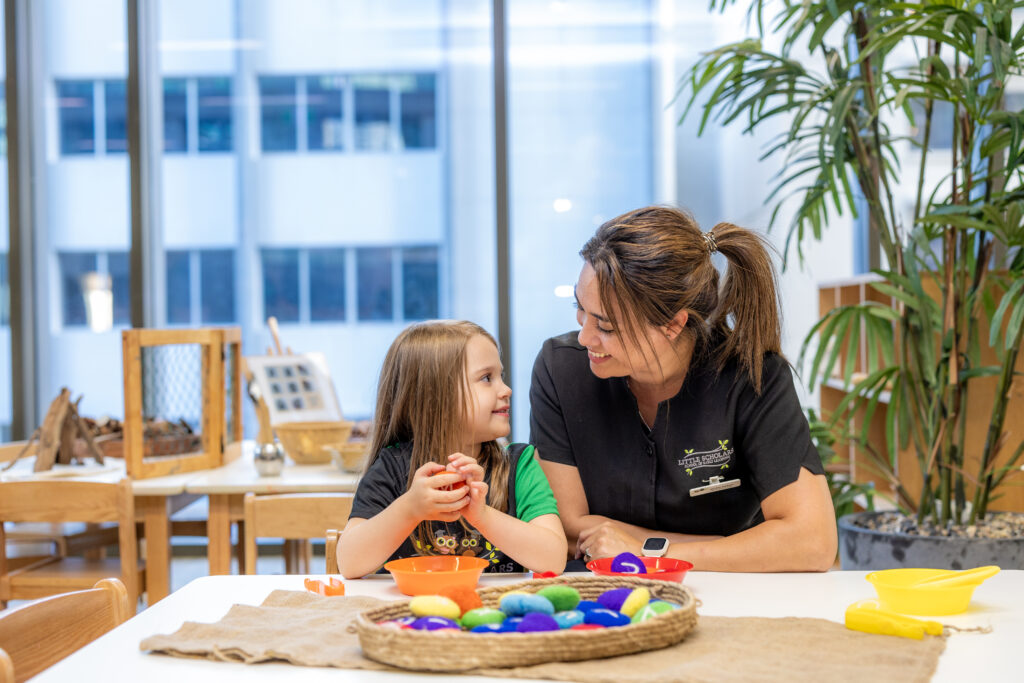
There are several requirements to qualify for the Child Care Subsidy. You may qualify if:
• You or your partner care for the child a minimum of two nights / fortnight
• You or your partner are responsible for childcare fees
• The child meets immunisation requirements
• You use an approved child care service like Little Scholars!
Once you’re ready for your child to go into early learning, you can apply for CCS!
The CCS works on three factors:
• Your total combined family income
• The service type. This can be long day care, or outside-hours care such as vacation care
• How much ‘work-related’ activity you and your partner undertake each fortnight This includes paid work, volunteering, study and other activities as determined by education.gov.au. Job hunting, studying, starting a new business, volunteering and travel time – among others – are all eligible activities that will allow you to claim subsidised hours of care.
Our website has a handy calculator you can use to get an idea of how much CCS you’ll receive.
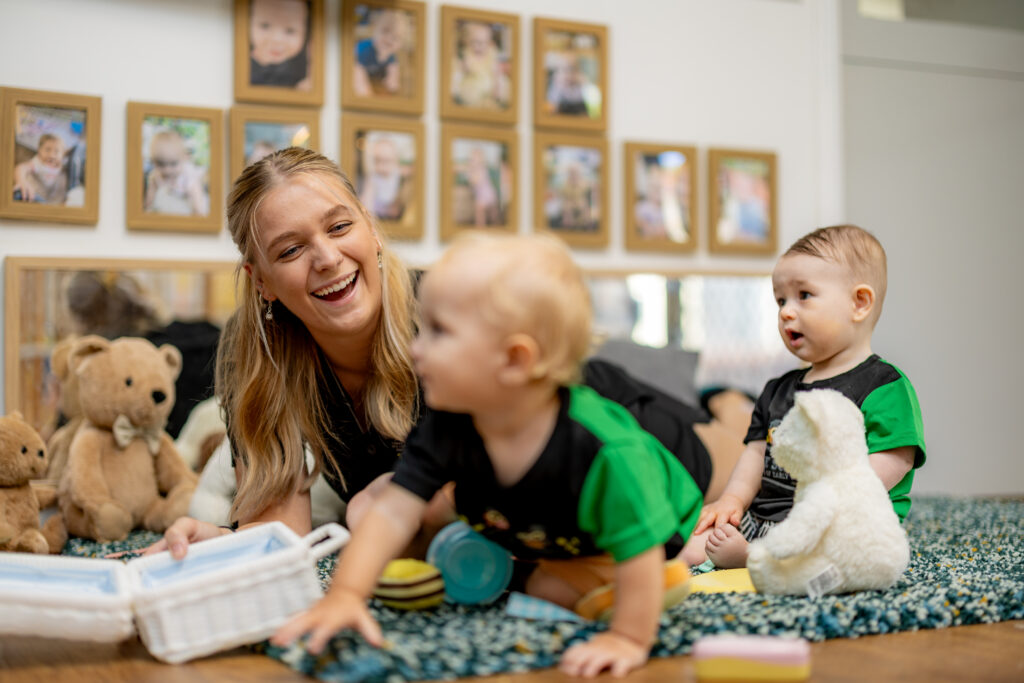
Apply for CCS via your MyGov Account, which is linked to Centrelink.
We recommend you do this as soon as you know when you might be sending your little one into early education and care, so it’s all set up and ready to go for your child’s first day. Don’t necessarily wait until you’ve enrolled with an early learning campus, because the entire process may take between four and six weeks, and if it’s not set up when you begin care, you may be paying full fees until it’s all complete.
Once your spot is booked in, confirm your Complying Written Agreement (CWA). When a CWA enrolment notice is created by the campus manager, there are two steps that need to be completed by the family:
1. You will be notified by email that the CWA is ready for you to agree to. A reminder will be sent via email should you not sign within 48 hours
2. Confirm your child’s government enrolment via MyGov. If you do not agree to the government enrolment, CCS cannot be paid.
During your Child Care Subsidy claim via MyGov, expect Services Australia to request a variety of documents to verify your eligibility. These may include financial details like bank account information, tax file numbers, and insights into your assets. Academic records, work-related documents like tax returns or pay slips, details about your living situation, relationship specifics, any international residence proofs such as visas, documentation regarding your children, and any relevant medical records are also crucial. Now that you know what to expect, we’d suggest these are prepared in advance to streamline your claim process.
Finally, we know change can be scary, overwhelming or confusing, as much for our parents as our little ones. We’re here for you from the day you book your tour to the day your child finishes their last day of kindergarten. We can absolutely help you navigate the CCS and other documents you need to help your child become a little scholars. Reach out to your campus manager, admin or any of the leadership team for guidance or further questions.
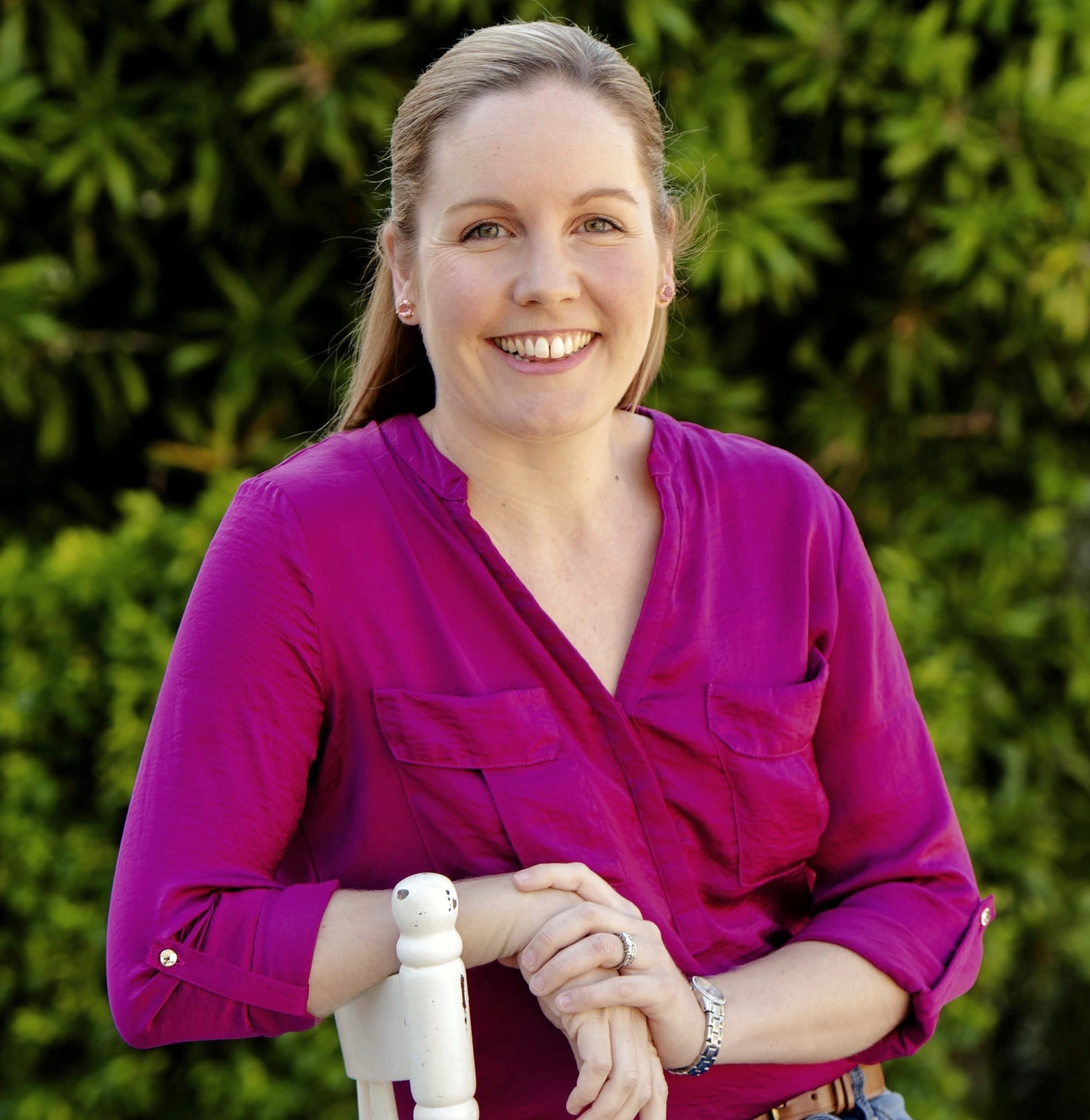
Are you looking for low-cost options to help the family stay cool this summer? The Gold Coast is home to a host of free or low-cost, family-friendly swimming spots that are sure to cool everyone off and provide hours of fun entertainment. Here are 8 spots to try this summer, from the northern most parts of the Gold Coast, right down to the southern Gold Coast.
Lions Park is located at the Jacobs Well Boat Ramp, and is a council-managed, netted swimming enclosure nearby the mouth of the Pimpama River. Here you will find a small sandy beach area with shade sails right up to the water’s edge, as well as barbeque and picnic facilities. This spot is great for younger children, as they can get a taste of the beach without large waves or long walks from the car to the water. Best visited at high tide, it can be a bit muddy at low tide.

Cabbage Tree Point is a small town just near Jacobs Well, with a boat ramp, small beach and Charlie Hammel Park. This is a great spot for the family to spend a morning – set up a picnic blanket under the trees by the ship-themed playground and enjoy a swim at the small, sandy beach. Again, being on the river this is best visited at high tide, but enjoyable all day long.
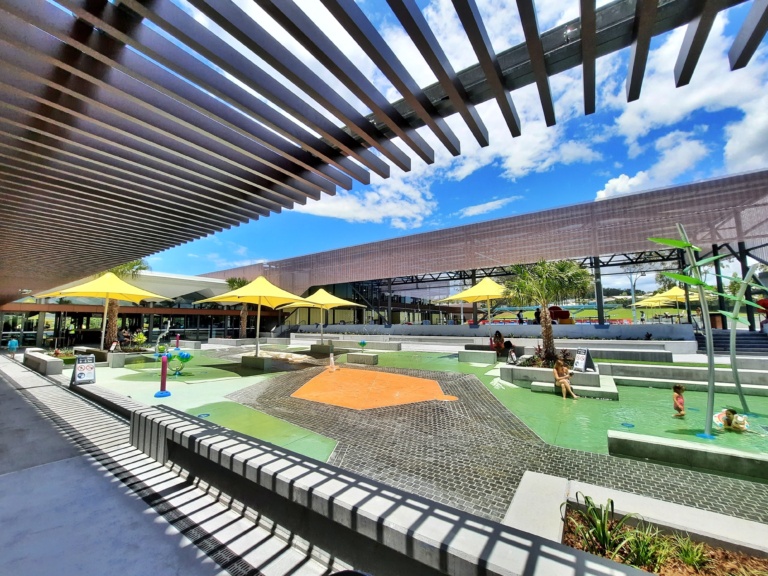
The Pimpama Sports Hub is the northern Gold Coast’s largest aquatic centre, with a 50-metre outdoor swimming pool, a 25-metre indoor swimming pool, learn to swim pool and a hydrotherapy pool. The children’s splash pad is exceptional, with water fountains, bubbling brooks and water at ankle depth – it’s ideal for toddler and primary school aged children.
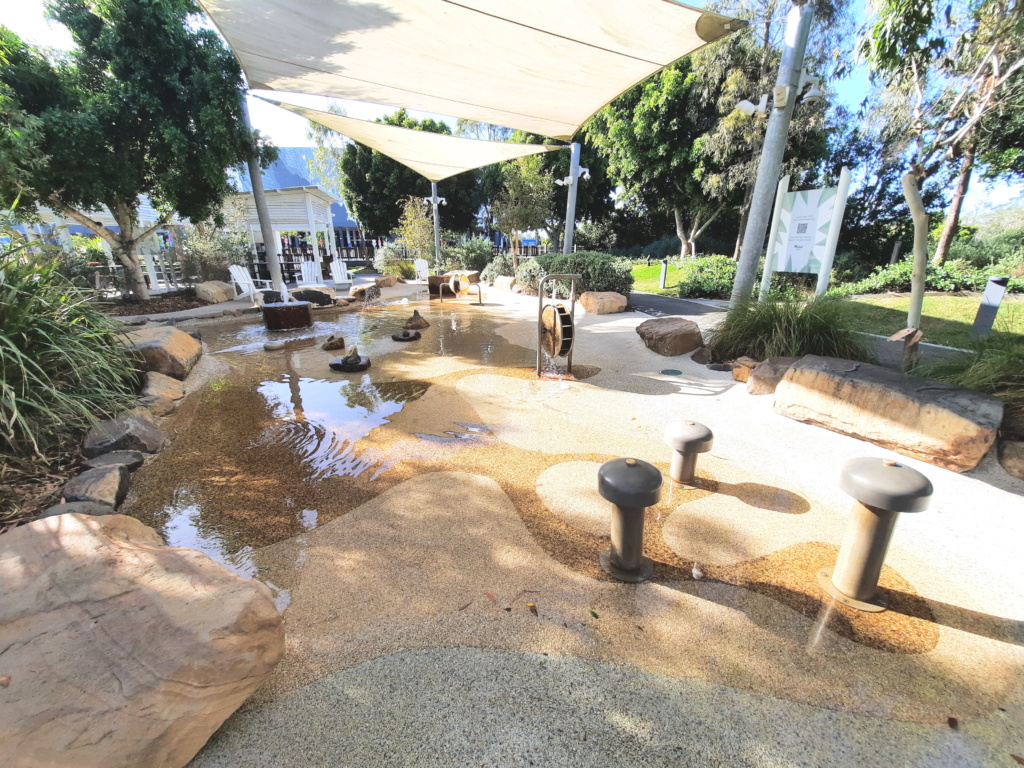
A splash pad might be the last thing you would expect to find at a shopping centre, but Westfield Coomera has one of the best free waterplay areas on the Gold Coast. Designed to resemble a billabong, waterways weave around interactive play stations where children can play with squirting frogs and jump across stepping stones. There are excellent change room facilities available and a café next door.
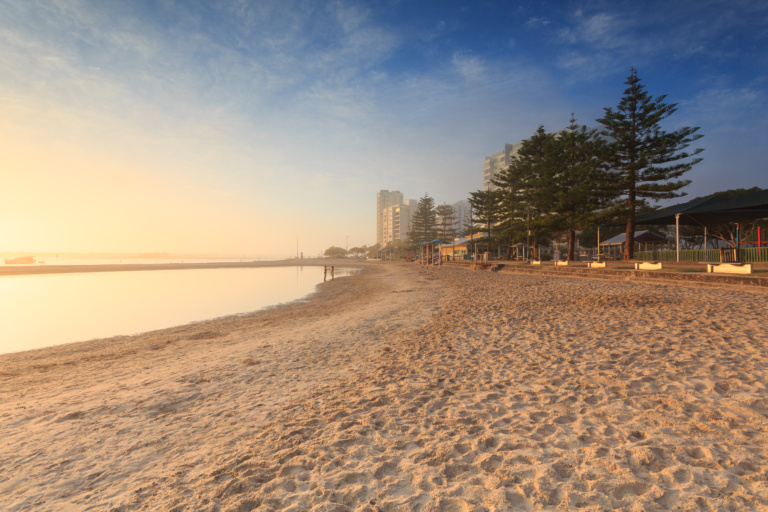
Ian Dipple Lagoon is a great place to go for a swim. Protected by a large sandbank, this lagoon is wave free and perfect for little ones. There are shower and toilet facilities along the shore as well, making the pack up easy. In the evenings, the lagoon is floodlit, so it’s also a great spot for dinner time fish and chips.
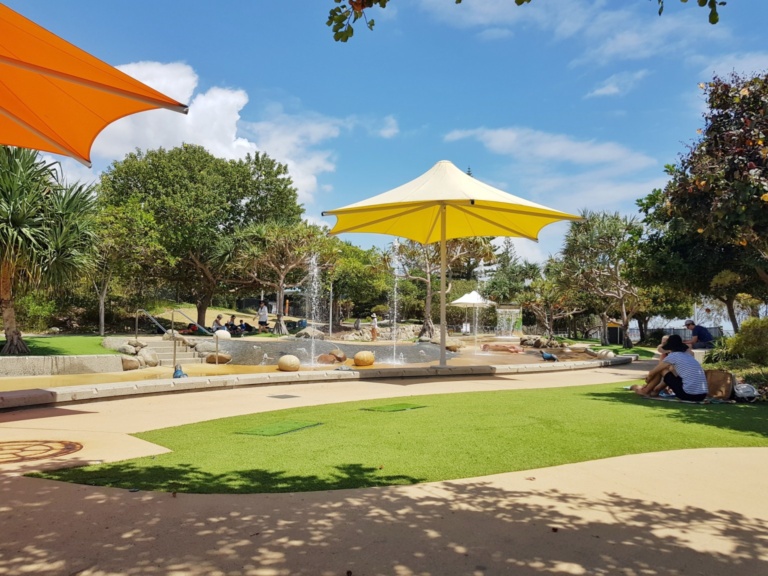
The Broadwater Rockpools might be the most popular water play space on the Gold Coast, with plenty of water fountains and vibrant marine-themed equipment to play with. The water play is built to resemble a creek bed, and it works like tidal rockpools with the water receding every 5-10 minutes and then returning again. The Rockpools are watched over by lifeguards during opening hours and it’s completely free to play.
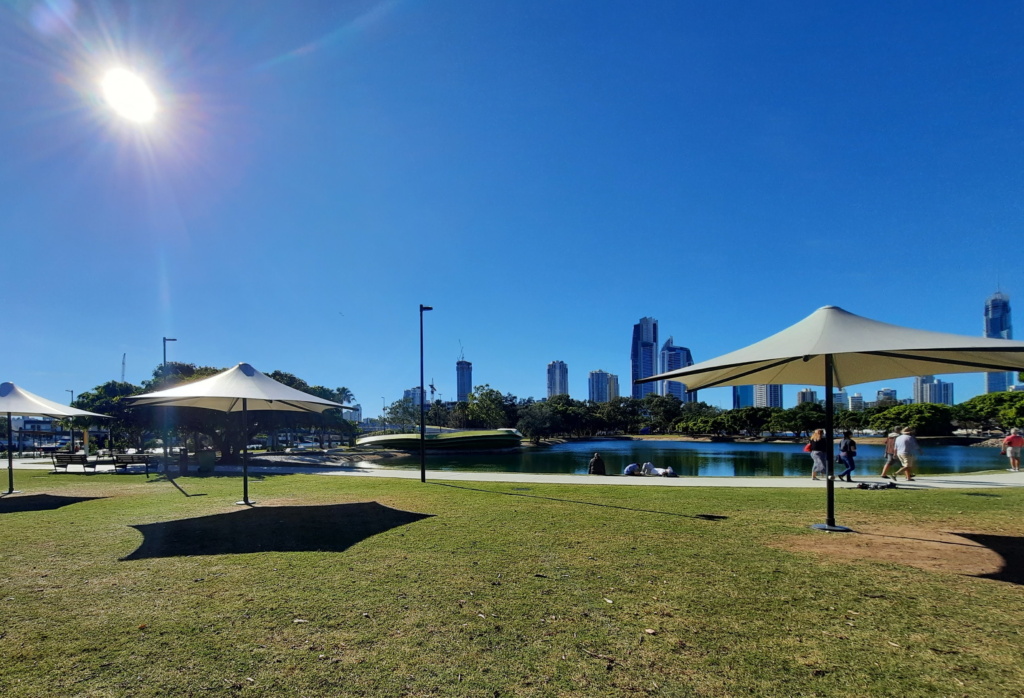
Located within the Home of the Arts precinct, Evandale Lake is a popular swimming spot for Gold Coasters. With a sandy beach around the outside, the lake has shallow edges but can be deceptively deep as you get further in. Families love to spend the day here, making the most of weekend food markets or a picnic lunch. There is a fun shaded playground by the lagoon too.
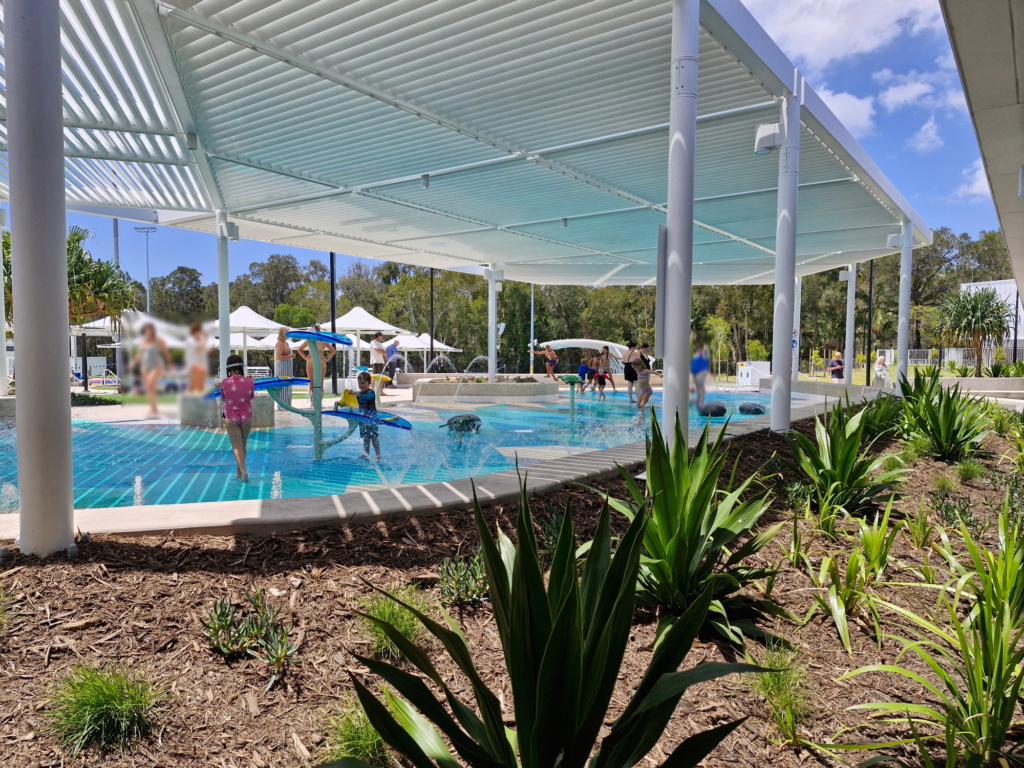
The newest water play destination on the Gold Coast, the Palm Beach Aquatic Centre opened at the end of October and now has a 50m outdoor pool, 25m outdoor pool, indoor warm water program pool, 25m indoor learn to swim pool, and an outdoor splash pad. The splash pad at Palm Beach is fairly simple in design, with plenty of sprayers along the ground as well as a few water play towers and spinners, but it is made entirely of a rubber base which is absolutely ideal for those crawling or learning to walk!
If you’re looking for early education and care for your young family, look no further than Little Scholars!
We offer your child the very best facilities, resources and early educational, play-based programs available, which are underpinned by the early years learning framework. We also believe in fun, wide-ranging experiences so that children can begin to develop interests and passions of their own, from Bush Kinder adventures to our broad extracurricular program which includes swimming for our kindergarten children, we believe in keeping wonder and magic in childhood.
Find Lara’s recommendations at her website Mrs. Lardeedah.com, and follow her socials Facebook and Instagram
Do you have a child who’s struggling with separation anxiety, especially at when being dropped off at school or early education? Perhaps they’re going through a developmental milestone that makes them need Mum or Dad a bit more than before. This is common starting around six months of age, peaks at 14-18 months, then can happen again when your child hits preschool and school-age. Or maybe your child is new to our service or has recently transitioned studios. The transition from home to early education is a milestone for both children and families. Separation anxiety can even happen for children who’ve been in Little Scholars for a while. It can be hard moving into a new studio where she or he doesn’t yet know new routines, where things are kept and spending time with different educators with different ways of doing things can be overwhelming for the child. This is all normal.
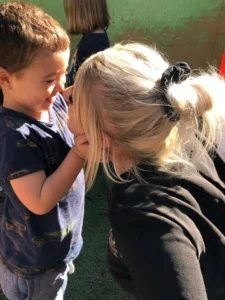
If you’re at a loss on how to make things easier on your little one, and yourself, we have some ideas.
Acknowledge and validate their feelings by saying something like “I know goodbyes can be hard, but I always come back. I will see you later today. I love you.” Give a big hug, a smile and a wink.
Then at home, if your child is old enough, have a chat about why she/he is having a hard time at drop-off, and think about what you can do to alleviate it. Ask him or her what make things easier. Perhaps it’s including a comfort toy, blanket or family photo. Maybe you each have a special bracelet that you can touch when you’re missing each other. Make a plan for something special together when you pick him or her up, like a walk or playing a game together, which will give your child something to look forward to through the day.
If you’re preparing your child to go to early education or school, it’s best they understand what their days will look like. So the conversation could look something like ‘we’ll all have breakfast together and get ready for the day. Then we’ll get in the car and first we’ll stop at Little Scholars. I’ll walk you in, give you a big hug, and you’ll go off to have a day of play while I go to work. When I finish work, I’ll jump in the car and come right over to pick you up, then we’ll go _____” These conversations may have to happen several times for it to sink in.
Also, if you’re pondering signing your child up for early education, this is why we offer play dates to children newly enroled but yet to start – this allows them to begin to become familiar with their new educators and studios.
Remember, you can always chat with your educator or campus manager about how to help. We’re always available, and we’ve been through this before, we can offer ideas or reassurances everyone will be OK!
We also know separation anxiety can be a two-way street, especially for new parents, or returning to work after maternity leave. Don’t forget we have our Little Scholars app so you can see pictures of your child, and be reassured that if there were tears from your child, they likely didn’t last long and they’re busy having fun and learning while you’re at work.
Related links:
Elizabeth Stone, an award-winning essayist and journalist, once captured the essence of parenthood with a poignant quote, ‘Making the decision to have a child – it is momentous. It is to decide forever to have your heart go walking around outside your body.’ This statement resonates deeply with many parents, astutely capturing the feelings of boundless love and the inevitable vulnerability that comes with bringing a child into the world.
This overwhelming surge of emotion is particularly intense during those initial moments and first days of separation from your child, often experienced when that child is entrusted to the care of someone else for the first time. It’s a milestone filled with mixed emotions for parents – pride in their growing independence, yet a deep longing to keep them close forever.
While the focus in the first few weeks at early learning facilities is generally on the children and how they’re settling in, an often-forgotten topic is the separation anxiety parents also can feel when they drop their little ones in care for the first time.
In childcare, we offer families tips on how to help children settle in, from suggestions such as: ‘don’t sneak away’, ‘keep goodbyes short’, and ‘maintain calm and confidence’, but what if the child is just fine, but the parents are struggling from the separation?
It’s understandable. If you’re coming off maternity or paternity leave, or perhaps you’ve been the primary parent at home for the last few years, change can be profoundly hard.
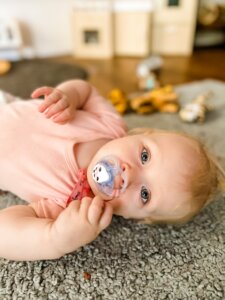
What we’re talking about is parental separation anxiety, and it’s more common than you think.
“I experienced separation anxiety with both my children when I dropped them into care for the first time, but I was much more surprised with my feelings the second time around,” says Christina, a communications professional who has two children. “I had to go back to work much earlier the second time around, and I felt a lot of grief for not getting to continue to bond with my son the way I had been, knowing he was my last baby. I also experienced some fears around him attaching to his educators more than me.”
A 2016 study by Pacey UK (the professional association for childcare and early years) reported that out of 1,000 mothers, 70% of mums said they worried about the extent they would miss their children, 90% reported feeling anxious about returning to work after having a child, while nearly half of mums admitted being very anxious.
How can parental separation anxiety manifest itself? Some of the more obvious signs are tears. Anxious feelings. Moodiness. While others you may not notice until they start affecting your life and mental health.
Here are some common indicators of more serious separation anxiety to be aware of:
Ask yourself, what is your biggest fear or worry in separating from your child? The initial step in overcoming these feelings is to acknowledge and understand them. If you’re experiencing heightened anxiety about being apart from your child, it’s important to explore the origins of these feelings. Perhaps they stem from experiences in your life in childhood, or birth trauma, the loss of pregnancy or another child, perinatal or postnatal anxiety/depression and existing anxiety issues, or it may simply be triggered by the act of becoming a parent.
“How does a parent reconcile these feelings of separating from their child? I think what’s important about that one is that often it’s around guilt,” says Sarah Bergman, a clinical psychotherapist at Counselling on the Coast who has more than three decades of experience in emotionally-focused therapy.
“Guilt is really an emotion that comes up when we have like an idealised sense of a situation or who we are. So we feel guilty when we don’t feel we’ve reached what we want to be reaching or we haven’t done what we want to do. I would say to explore those feelings of guilt, what they are, what you feel like you’re not doing for your child or getting right for your child.”
Sarah says those guilty feelings in parents often link back to situations in their own childhood where they felt like their own parents let them down. But the concern is also passing down those guilty or anxious feelings to your child.
“Their own wounds start to muddy the waters of the child’s experience. So the child’s just going to school, but then they feel their parents anxiety and then they also think that something’s wrong then too, which can make them anxious. So if the parents have a good look at themselves around, ‘what was it that my parents got wrong for me? or what was it that wounded me? and how does that now play across on my child?’ So the parents will often work hard to do the things that they don’t want that their children to experience themselves.”
While Sarah says often the guilty feelings stem from what they missed in their own childhood, the opposite could be true.
“Maybe [parents feel they’re] not meeting the ideals of what your parent did for you or what things that you really loved about your parent and now you feel like you’re not getting that right.”
Wherever the feelings stem from, Sarah says, parents may be trying to heal themselves through their relationship with their child. But, she says, a child doesn’t have those wounds. They don’t experience their parents in that same way that perhaps you did. So she surmises parents could be overcompensating for their own childhood pain.
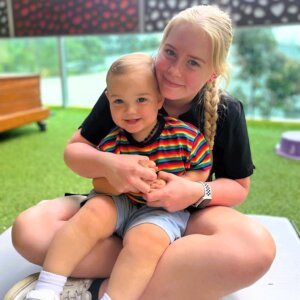
“Those kind of parents are very anxious at feeling like they have to attend to everything with their children because they don’t ever want their children to feel the way that they did,” Sarah summarises.
Consider jotting down your feelings or discussing them with a sympathetic friend or even a colleague who could relate with what you’re currently experiencing. Regardless of how trivial or illogical they might seem, allowing yourself to express and discuss these fears can aid in releasing them.
Making the decision to have a child – it is momentous. It is to decide forever to have your heart go walking around outside your body.
Elizabeth Stone
Sarah also suggests parents educate themselves on secure attachment, a theory first proposed by the British psychologist, psychiatrist, and psychoanalyst John Bowlby. For children, secure attachment to someone like a mum or dad allows them the secure base necessary to explore, learn and relate, and the well-being, motivation, and opportunity to do so. It’s important for safety, stress regulation, adaptability, and resilience and ultimately can help produce a happy, healthy well-adjusted child.
“If you are securely attached, you will feel less anxious because you will feel comfortable that you can trust, you have a positive view of other people and a positive view of self,” Sarah says. “So you think to yourself, ‘it’s okay. My child is in safe hands. They will let me know. I trust the daycare centre. And I trust myself that I’m doing the right thing by my child and it’s going to be okay and I need to go to work and this is just the way it is.’ Whereas someone who is more anxiously attached sometimes have a bit of a negative view of themself and possibly a bit of negative view of others so they don’t totally trust others, so it’s about trying to move into being more securely attached.”
She also says to have an honest conversation with educators or your campus manager.
“You know, that is actually good secure relating as well, that a parent can actually say, ‘I’m feeling a bit nervous’, or ‘I’m a bit worried about that,’ because they’re asking then, they’re not coping alone.”
Sarah recommends in that conversation, have a chat with educators or your campus manager about what might help to alleviate those anxious feelings, whether it’s a phone call or a text, a few extra pictures – whatever it is, having clear communication can help everyone.
“What helped me was an honest discussion with my son’s lead educator during a playdate. She asked me thoughtful questions about why I was having a hard time, asked how she could help alleviate those feelings for me, and was very mindful to update with lots of pictures, and even checked in on me at pick-up over the next few weeks. It was really helpful, and gave me feelings of trust in leaving my baby with her and her team,” Christina adds.
Those secure attachments we want children to have means we also want them to have bonds with others, such as loving educators.
A child who has had a secure attachment with her parent or another safe adult is more likely to be able to develop lasting successful relationships as an adult. In fact, a New York University study recently found positive, warm relationships between caregivers and children were associated with higher odds of attaining ideal heart health at multiple points across a 20-year span of adulthood, so developing these bonds is good for their health!
Part of early childhood training for educators is understand various child development theories such as attachment theory, so trust that your educators understand what secure attachments – both to parents and others children can trust – mean for children’s development and they work hard to ensure these bonds with your child.
Research has found our adult relationships are shaped by our early patterns of attachment and the ways we learn to deal with closeness and separation.
“Children are very attached to their parents and they love their parents very much. And that is who they want to be with. And if they create an attachment with someone else, that’s lovely. However, ultimately it’s important to keep in mind they will want to be with their parents,” Sarah says.
Sarah also says some of these feelings may be pressure we put on ourselves as parents.
“We don’t actually have to be perfect parents and I think a lot of people are really trying to be perfect parents and wrapping their children in bubble wrap. You just have to be good enough. I think from memory it’s only like around 60 or 70 per cent strike rate of meeting the child’s needs.”
Sarah is referring to the Winnicott theory.
“The good-enough mother is one who makes active adaptation to the infant’s needs, an active adaptation that gradually lessens, according to the infant’s growing ability to account for failure of adaptation and to tolerate the results of frustration.” – D. W. Winnicott, paediatrician and parent-infant therapist.
“We all have to learn that sometimes our needs aren’t going to be met. And that’s actually where we build resilience and we build understanding around that other people have things they need to do as well,” Sarah says. “You don’t have to drop everything to be there for your kids. It’s okay to have ruptures with your children. It’s actually okay because that is a realistic expectation on relationships. We all have ruptures and then we get to learn how to repair those ruptures. But of course, if the child’s fallen over or they’ve hurt themselves or they’re scared at night, you want your strike rate on those things needs to be closer to 100 per cent.
“But otherwise, we don’t have to be so hard on ourselves, we can get it wrong sometimes. We just go back and say, ‘Hey, I’m sorry I got that wrong.’ And then the child also learns that they’re going to get things wrong sometimes, too. They can come to their parent and say, ‘Hey, Mum, sorry about that.’”
If we can offer some advice, it’s what we also suggest to parents when children are having a hard time with separating. Find an activity you can do together outside of care hours that you can look forward to, so you can cherish your time together. Maybe after pick-up, you take your child for a walk or to the park, maybe it’s grabbing a sneaky ice cream after dinner, maybe it’s a game night or story time when you get home. Find ways to really connect with your child in the time you’re together may make the time you’re apart easier to deal with.
Sarah says mindful activities can help in easing anxious feelings. But, she says, if these feelings are taking over, it might be worth talking to a professional as soon as possible. You can talk to your GP about a referral to see a psychologist, or you can book in to a specialist practice such as Sarah’s Counselling on the Coast to have a chat with a psychotherapist.
Please remember, if Little Scholars can help in any way, we will, from offering a listening ear, to phone calls to whatever would help your family, we will. We’re not just here for children, we’re here for the whole family.

Grandparents have always shared a special bond with their grandchildren, but nowadays they are also playing an increasingly important role as a caregiver, as children spend much more time with their grandparents than ever before. Sometimes however, the generation gap can make it hard to think of new and fun things to do together that appeal to everyone.
Whether the grandchildren are spending an afternoon, a weekend, or the school holidays with you, this list is sure to keep children and grandparents of all interests and physical abilities, entertained and making memories year-round.
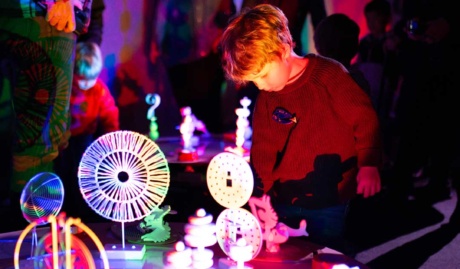
Each year, World Science Festival Brisbane paints the town red and takes science out of the laboratory and into the streets, parks, museums, galleries and performing arts venues of Brisbane and regional Queensland! World Science Festival Brisbane offers interactive and informative experiences for inquisitive young minds, with a huge range of family-friendly events and workshops.
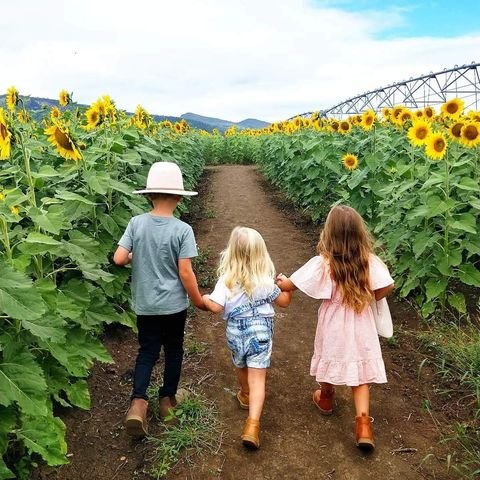
Gather your family and friends and join in a fun weekend in the Scenic Rim region, filled with live entertainment, workshops for children, cooking classes, mini photo sessions, arts, crafts and much more. Don’t forget the star of the show – strolling through beautiful sunflower fields and picking your own to take home.

Surfers Paradise beach becomes a playground of light, music and entertainment at SeaFire, Australia’s only international fireworks competition. Nations compete to take home the SeaFire Championship title, so this is a chance to see choreographed fireworks displays fired off ocean barges. Bring your picnic blanket and set up in the sand for beautiful firework vistas. There is also plenty of pre-entertainment including food trucks, music and roving performances.
5-8 pm, free!

Kalfresh Vegetables throw open the doors to their farm and factory and welcome carrot-loving visitors each June!
See how they grow, pick, wash and pack carrots, as well as celebrate all things carrot with carrot juice, carrot sausages, carrot cake and carrot bread! Everyone can get their hands dirty with carrot picking on the farm, taking home as many as you can carry.
This year’s date has yet to be released, so keep an eye on Kalfresh’s social media channels for its official date. This is held on the Scenic Rim, at Kalbar on the Cunningham Highway in the Fassifern Valley.
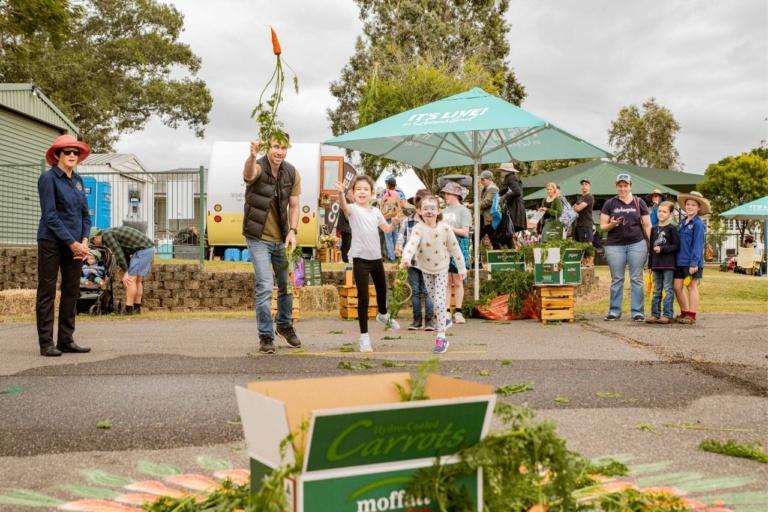
The Winter Harvest Festival is the Scenic Rim’s signature event where you can experience Eat Local Month in one glorious, flavour-filled day! Chefs, growers. producers, and artisans come together to showcase the region’s culinary treasures. There will be more than 60 market stalls offering fresh seasonal produce, local wines, beers and spirits, cheeses, meats, and more. Alongside these culinary delights, you’ll find a variety of handcrafted goods and local creations, all crafted by the region’s skilled artisans.
There are food displays, workshops, produce stalls and a huge festival environment where the children can take part in a variety of games, activities and food related fun.nteractive activities like tractor pulling, carrot tossing, and farm animal cuddles. They’ll enjoy face painting, garden games, and fun, educational experiences that teach them about agriculture and food in a hands-on way.
Don’t miss the annual Tractor Pull competition!
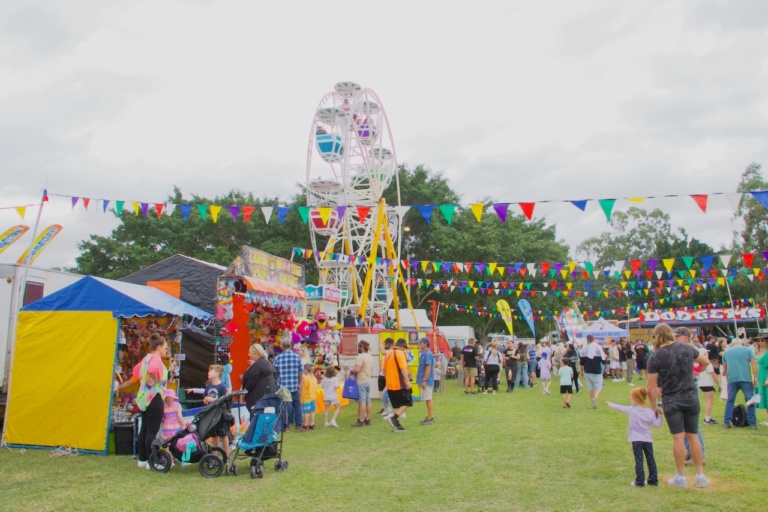
Where country meets the Gold Coast! Get up close and personal with cute animals, meet the farmers and exhibitors and taste delicious foods made from locally sourced ingredients. Watch the woodchop, and enjoy the equestrian program. Wander through the pavilions, check out the crafts and cooking, from honey to homebrew, lace to LEGO, fine arts to photography, and flowers to fruit sculptures and explore the best agriculture has to offer. Finish the day off with an incredible fireworks display!
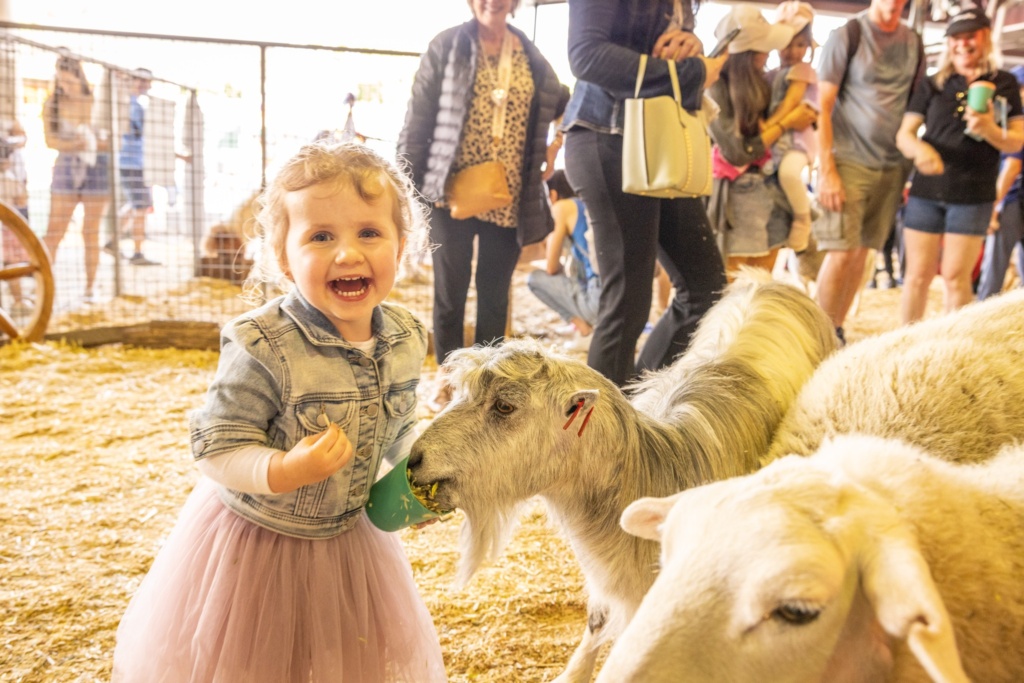
The Royal Queensland Show (Ekka) is Queensland’s largest and most loved annual event, now in its 149th year, bringing the country and the city together for a big celebration of agriculture. Enjoy competition entries from woodchop to giant vegetables, there’s 10,000 animals from beef cattle to cats and dogs, world-class live entertainment, award-winning food and wine, carnival rides and showbags, family shopping, educational activities and much more.

The Pacific Airshow Gold Coast is a three-day weekend event that features aerobatic demonstrations by the world’s best aviators. Attendees can join in meet and greets with the pilots, check out the family zone packed with aviation themed games and activities, and relax beachfront while watching paratroopers, stunt planes, helicopters, military planes and more from around the world perform.
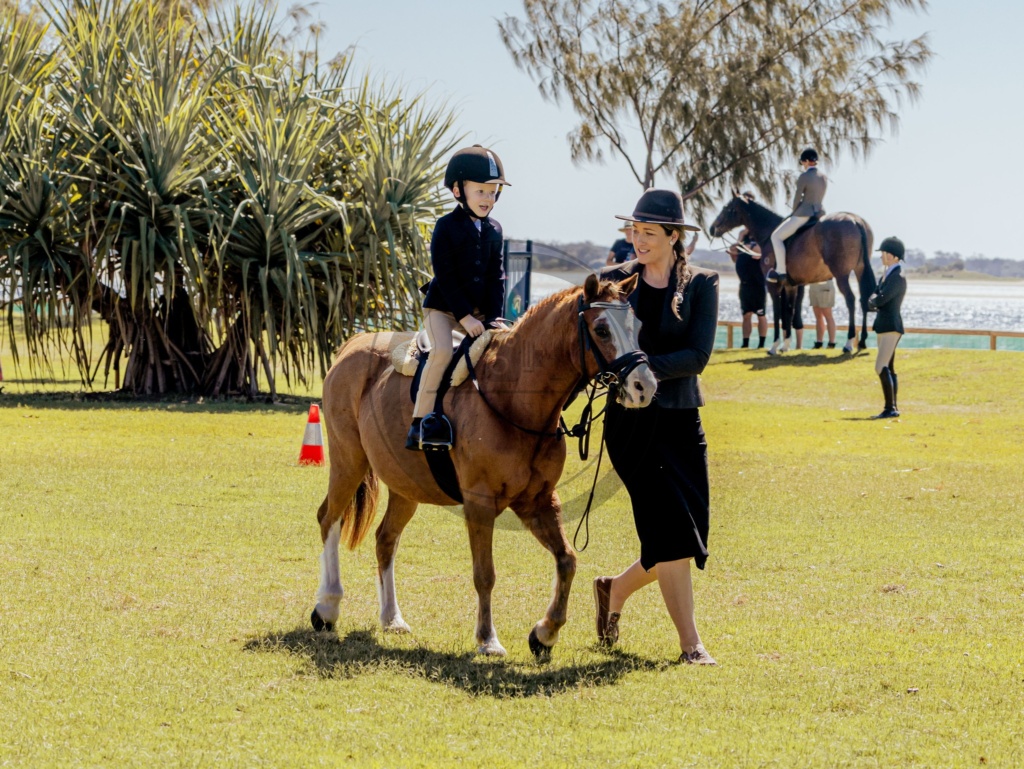
Immerse yourself in the family fun and excitement of the Gold Coast Show! Set on the beautiful Broadwater Parklands on the Gold Coast, this FREE show attracts tens of thousands of families annually. Enjoy woodchop, equestrian, food and beverage stalls, exhibits, games and rides. Each night also concludes with an incredible fireworks show.

Riverfire is Brisbane’s most spectacular night of the year. The launch event for the three-week Brisbane Festival, Riverfire brings families from across south-east Queensland to South Bank for a night that lights up the skies. Entertainment begins from 4pm, including an RAAF aerial display, with the main event – the state’s most spectacular annual fireworks display – lighting up the sky at 7pm.

RedFest is Redland City’s main event, showcasing musicians and artists from across the region. For two days, the Redlands Showground becomes a celebration of the amazing community, with performers sharing their skills across the showground. Families are also taken care of, with a children’s program, featuring a range of free activities including farm animals, puppet shows, rock climbing and free face painting, Sideshow alley and spectacular fireworks.
The date is still in the works, check RedFest’s social media channels for date confirmation.
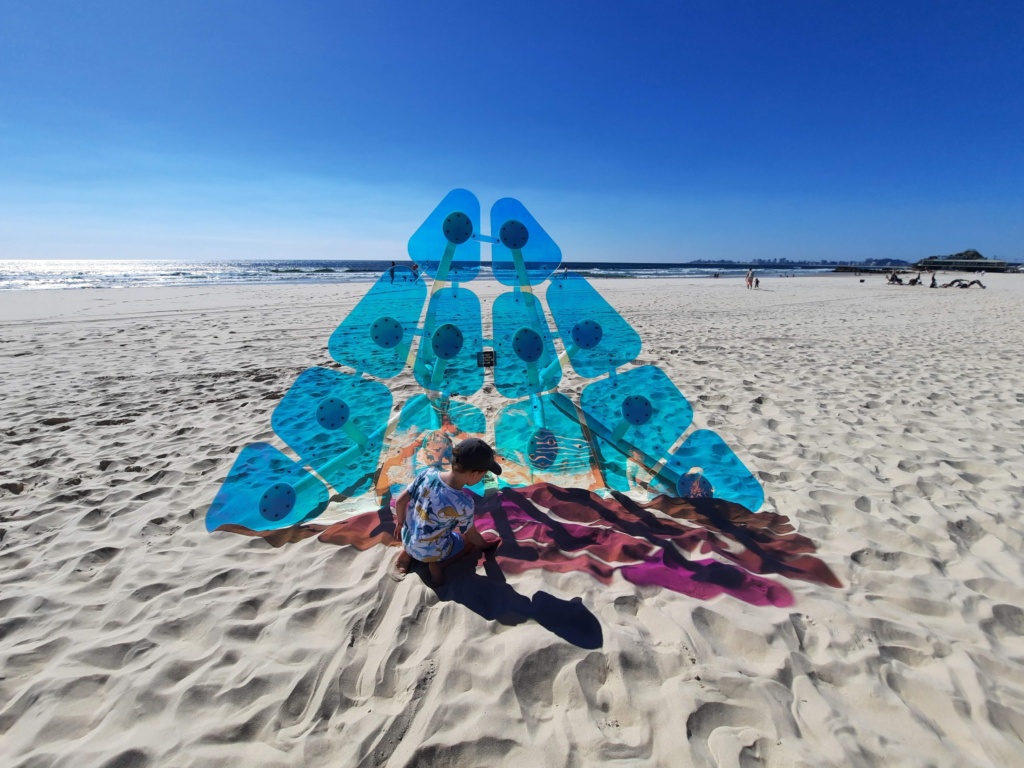
SWELL is Queensland’s premier outdoor sculpture exhibition, set along Gold Coast’s Currumbin Beach. For 10 days, more than 60 small, medium and large-scale sculptures will be set up along the beachfront and boardwalk for families to view.
The Family Zone activation is always popular, with workshops, activities, a BookFest setup where children can take home a free pre-loved book, live music and chill out zones set up under the leafy trees. Go at sunrise or sunset to beat the heat and experience the sculptures in a different light.
When considering how to look after your family during the work week, look no further than Little Scholars!
We offer your child the very best facilities, resources and early educational, play-based programs available, which are underpinned by the early years learning framework. We also believe in fun, wide-ranging experiences so that children can begin to develop interests and passions of their own, from Bush Kinder adventures to our broad extracurricular program which includes swimming for our kindergarten children, we believe in keeping wonder and magic in childhood.
Find Lara’s recommendations at her website Mrs. Lardeedah.com, and follow her socials Facebook and Instagram

The festive season is here and the opportunities to get in the spirit are endless! Why not check your shopping list off at a Christmas market, jingle along at a carols concert or putt your way through a Christmas wonderland. To make sure you do not miss out on the festive cheer, here is your go-to guide with only the best of the best Christmas happenings picked out for you. Be sure to add these dates to your calendar!
Get ready for an exciting and interactive Santa show! Join Santa, Mrs Claus and Rudolf for a Christmas extravaganza that includes a mix of traditional carols and current pop songs.
Pacific Pines Central Park, 4-8:30pm
Image via City of Gold Coast
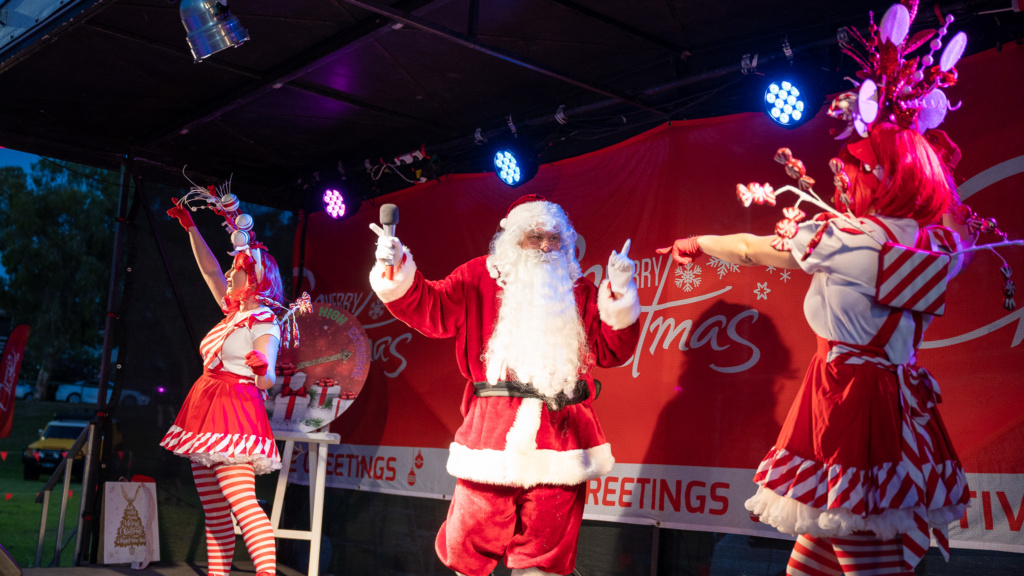
This free family festivity will feature live music, market stalls, inflatable fun, local restaurant specials, games and activities, plus a visit from Santa Claus.
Ron Short Park, 4-8pm

Bring your family for the largest carols event on the northern Gold Coast, an unforgettable night with fireworks, food vans, and festive sing-alongs.
Brien Harris Oval, from 4pm
Image via Northern Gold Coast Carols Facebook page

One of the all-time favourite Christmas carols will be performed in a 2-hour celebration of song and dance on the beach, with a visit from Santa, and a fireworks finale!
Surfers Paradise Beach, 5-8pm
Image via City of Gold Coast
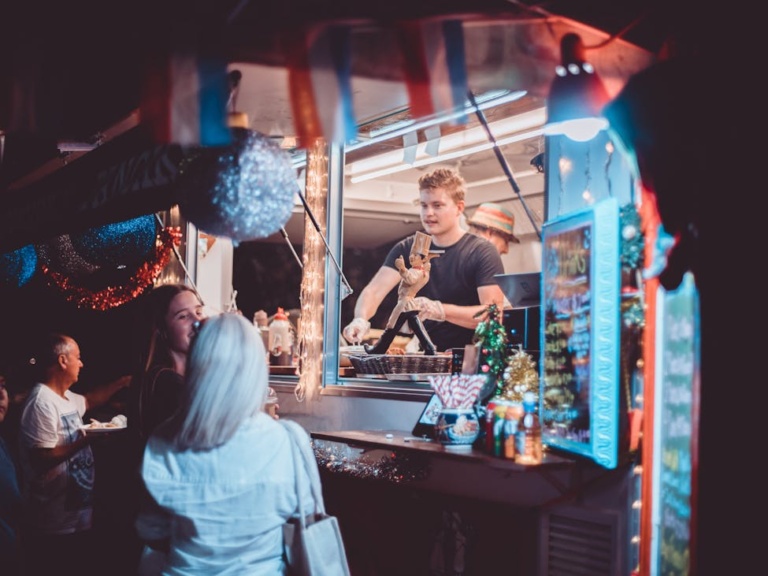
Wind your way through the Market lanes to the sweet serenades of stunning live music, spot roving performers, snap a selfie with an elf… or meet Santa himself!
Home of the Arts, 4-9pm
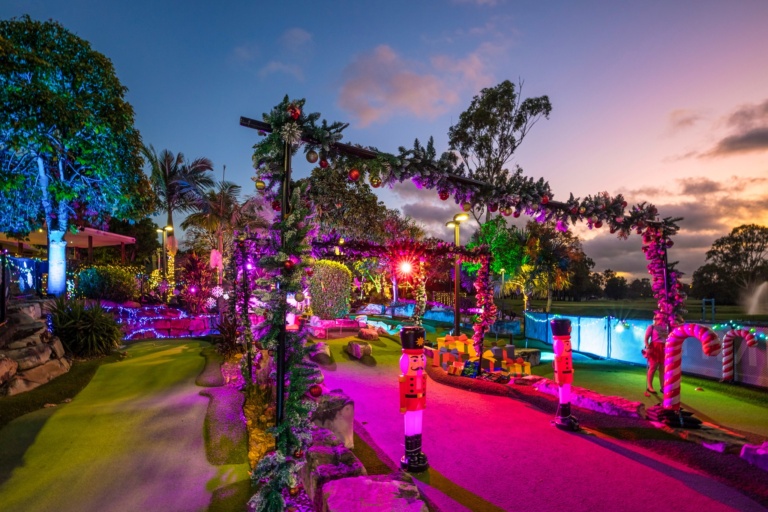
The elves have been busy transforming the 9-hole mini golf course into a spectacular Christmas wonderland!
76-122 Napper Road, Parkwood
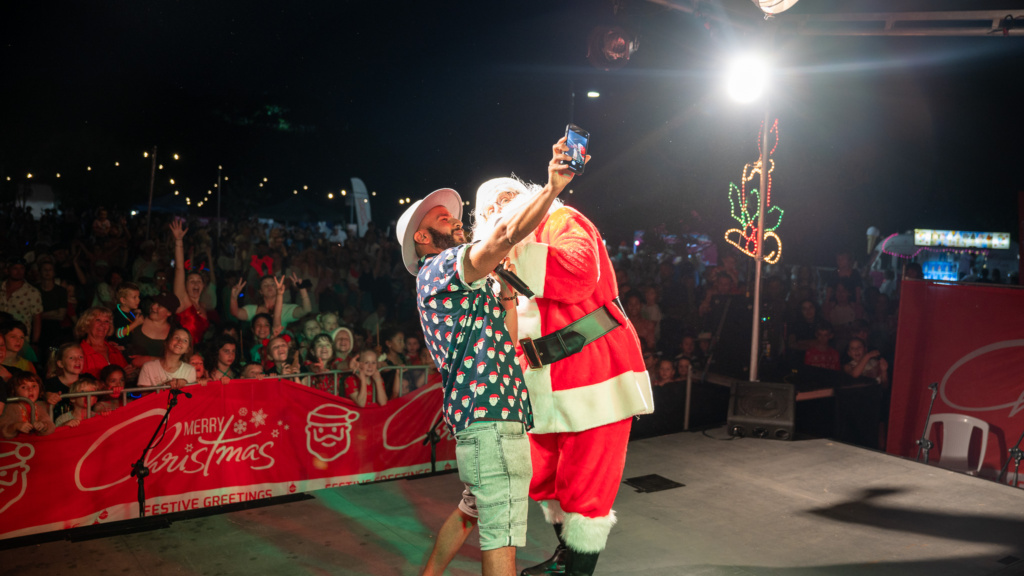
Free live music on stage, roving performers, children’s entertainment, fantastic food trucks, and Christmas market stalls. Plus see Santa making a special appearance alongside a fireworks display.
Ed Hardy Park, 4-8pm
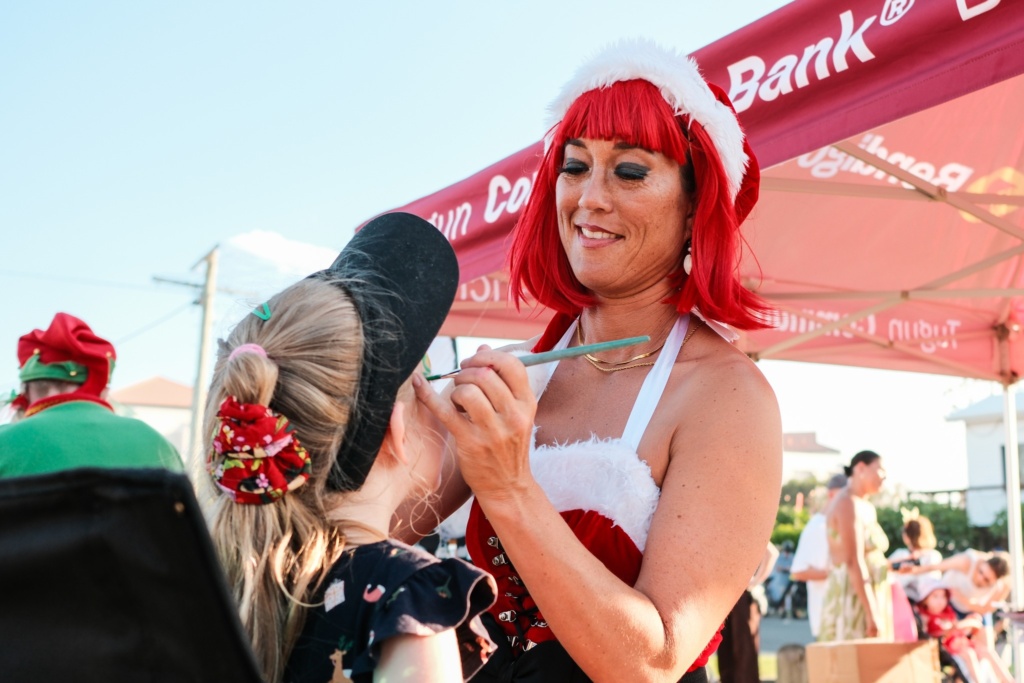
Dine under the stars at one of the fantastic local eateries, check out the local business offerings, and visit the Christmas market stalls. Plenty of free children’s entertainment on offer throughout the program with Santa making a special appearance!
Toolona Street, Tugan, 4-8:30pm

Sing along to your all-time favourite carols, enjoy a delicious assortment of food trucks, watch Santa fly in and watch a sparkling fireworks finale!
Queen Elizabeth Park, 5:30-7:30pm
Image via Shutterstock

A truly unique festive celebration, this event will feature live stage entertainment, Christmas carols, Santa, Fireworks over the beautiful Lake Orr and much more!
Waterfront Stage, Varsity Lakes, 4-8pm
Image via Carols on the Lake Facebook page

A fabulous, family Christmas event with market stalls, food trucks, Santa, Christmas carols, live music, facepainting and free children’s craft area.
Mudgeeraba Showgrounds, 3-8pm
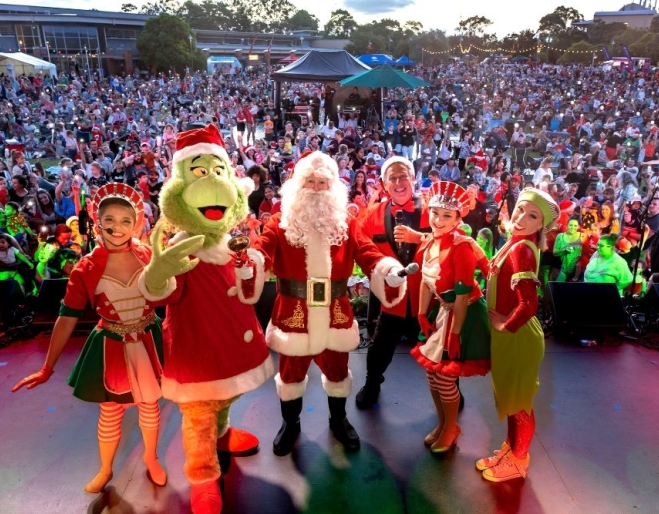
The City of Logan Christmas Carols is the city’s biggest annual Christmas event. This free, family-friendly event features hours of on-stage entertainment, festive activities, food trucks, and markets, all jam-packed into one magical day.
Kingston Butter Factory Cultural Precinct, 3-8:30pm
Image via Must Do Brisbane
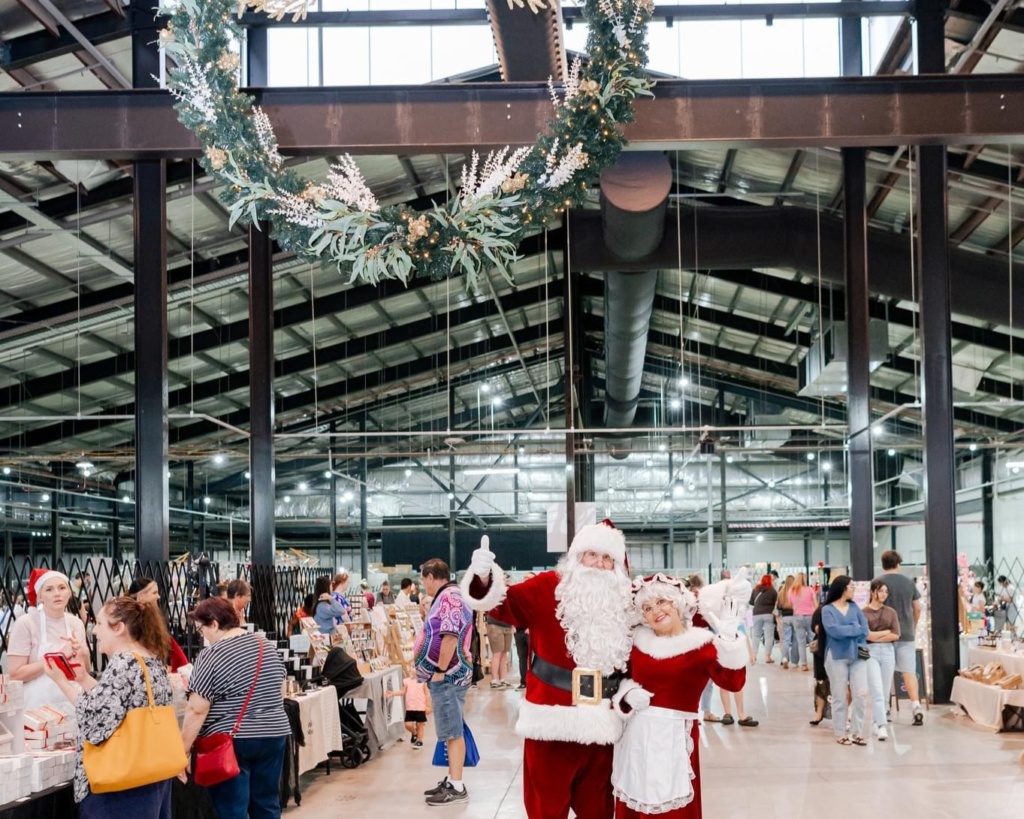
Experience a pop-up Christmas market brimming with a variety of local vendors, a special visit from Santa’s elves, and Mr & Mrs Claus will drop by for photos under a larger-than-life wreath, suspended above the Market Hall.
Distillery Road Market, 11am-9pm
Image via Facebook event

A free 7-minute light and sound show running at 6:30pm, 6:45pm, 7pm & 7:15pm. Get ready to catch all the “bubble snow” at the end!
Image via Redland Performing Arts Centre
If you’re looking for early education and care for your young family, look no further than Little Scholars!
We offer your child the very best facilities, resources and early educational, play-based programs available, which are underpinned by the early years learning framework. We also believe in fun, wide-ranging experiences so that children can begin to develop interests and passions of their own, from Bush Kinder adventures to our broad extracurricular program which includes swimming for our kindergarten children, we believe in keeping wonder and magic in childhood.
Find Lara’s recommendations at her website Mrs. Lardeedah.com, and follow her socials Facebook and Instagram

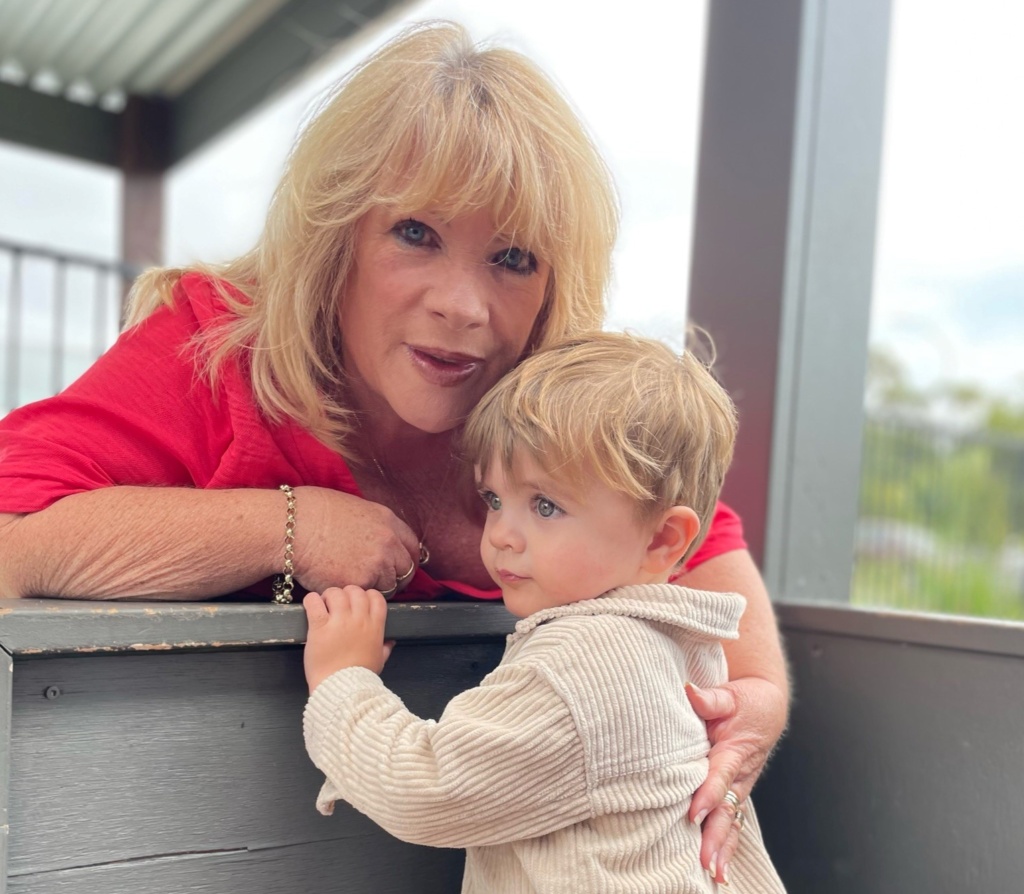
Grandparents have always shared a special bond with their grandchildren, but nowadays they are also playing an increasingly important role as a caregiver, as children spend much more time with their grandparents than ever before. Sometimes however, the generation gap can make it hard to think of new and fun things to do together that appeal to everyone.
Whether the grandchildren are spending an afternoon, a weekend, or the school holidays with you, this list is sure to keep children and grandparents of all interests and physical abilities, entertained and making memories year-round.
A beautiful day on the Gold Coast’s waterways make for some stunning views and great sight-seeing! The Gold Coast’s very own hop-on hop-off ferry is the perfect multi-generational way to spend a day. Departing hourly from five iconic Gold Coast destinations, including the famous Surfers Paradise and HOTA, Home of the Arts, you can hop on at any of the five stops, and stay aboard for the full loop (two hours) or explore the hop-off destinations at your leisure. Enjoy a drink from the onboard bar whilst the friendly captain keeps you entertained with informative commentary, music, local tips and wildlife spotting. Children can also meet the captain and have a turn driving the boat. There are a range of ticket options available, from day passes to long hops and short hops – depending on your budget and timeframes. Children under five always travel for free too!
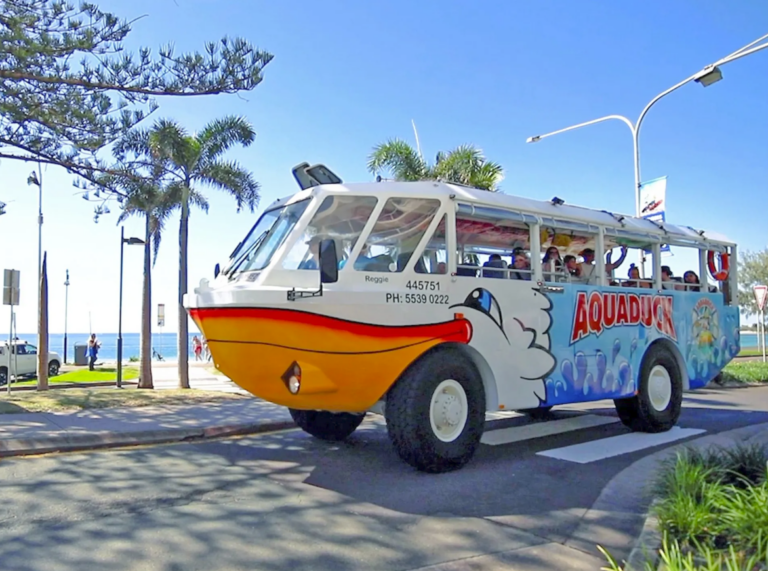
Another way to take to the water is with the iconic AquaDuck, and while it’s touristy, it’s a really great family outing, and perfect for multigenerational passengers. Embarking in the heart of Surfers Paradise, drive down the Esplanade overlooking the beautiful beaches and head towards The Spit. Once you reach the boat ramp just past SeaWorld, the tour changes pace and you’re heading for the water! Watch as the amphibious ‘duck’ changes from bus to boat and gently glides into the water. Now you’ll head through the Broadwater to check out how the millionaires live. You’ll finally return to land and drive down Tedder Avenue, before finishing back up at Cavill Avenue. The tour takes about an hour and is very family friendly, with children offered the chance to drive the boat and get their Captain’s certificate!
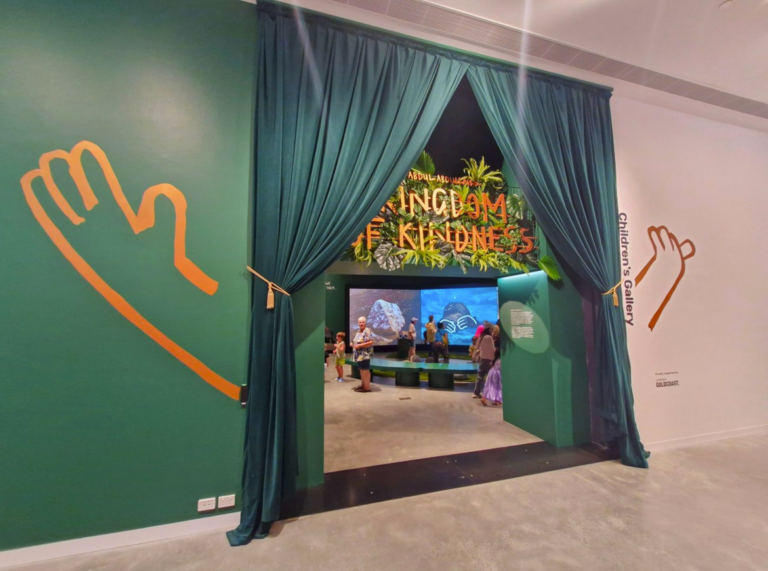
While the HOTA Gallery may be designed to cater for international art exhibitions, grandparents looking to give the grandchildren some culture will feel right at home! The Children’s Gallery at HOTA Gallery lets little artists get hands on – you won’t find any “do not touch” signs here! The Children’s Gallery changes every few months, each time offering a variety of interactive exhibits that complement the main galleries. After visiting the Children’s Gallery, take a stroll through the other free Galleries where you’ll find a few installations that are interactive and the children will love. Be sure to also ride the lift to the top floor and take in the Gold Coast skyline view! Fabulous 270 degree views await and there’s a guide you can use to work out what all the buildings are.
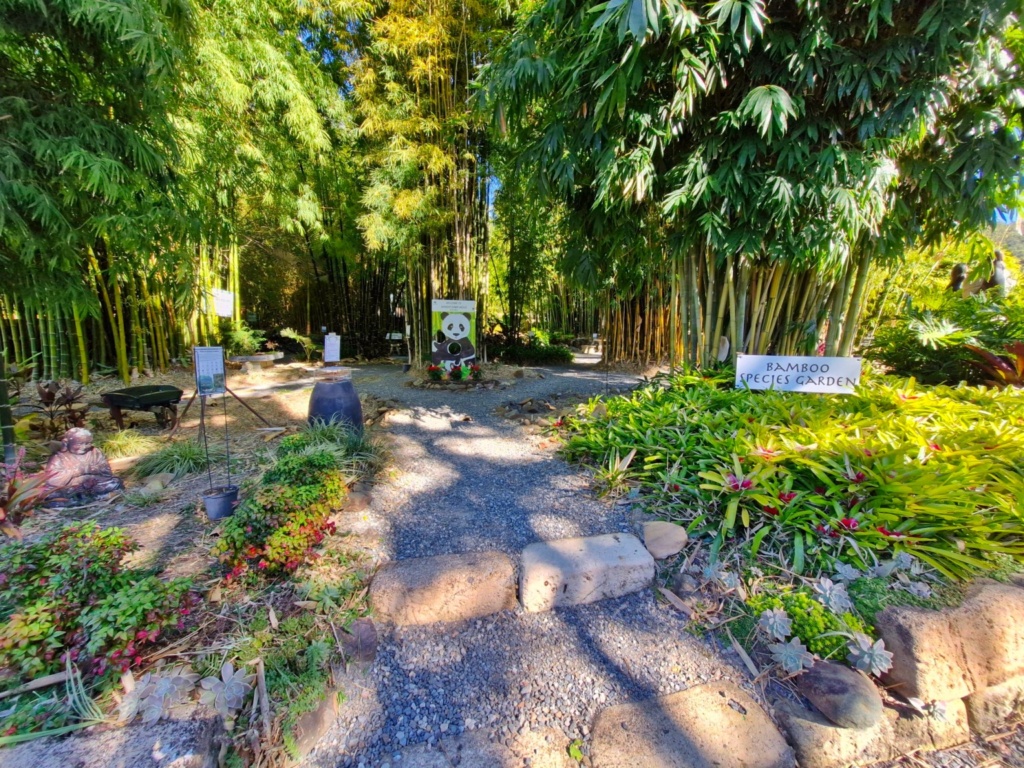
Bamboo Down Under at Wongawallan is a garden centre with a difference. The perfect grandparent’s day out, here you can explore a species garden, meditation garden, labyrinth, sensory garden and bamboo tunnel, and get bamboozled in the bamboo maze! Children can take on the Scavenger Hunt to discover the hidden pandas, all the while having a look at some incredible ornamental species of bamboo. Don’t miss the Rainforest Walk, a very peaceful stroll through a forest of enormous bamboo varieties. Dotted throughout are information signs about bamboo, little panda ornaments and other garden statues. Don’t miss the enchanted hollow at the end of the Tunnel.
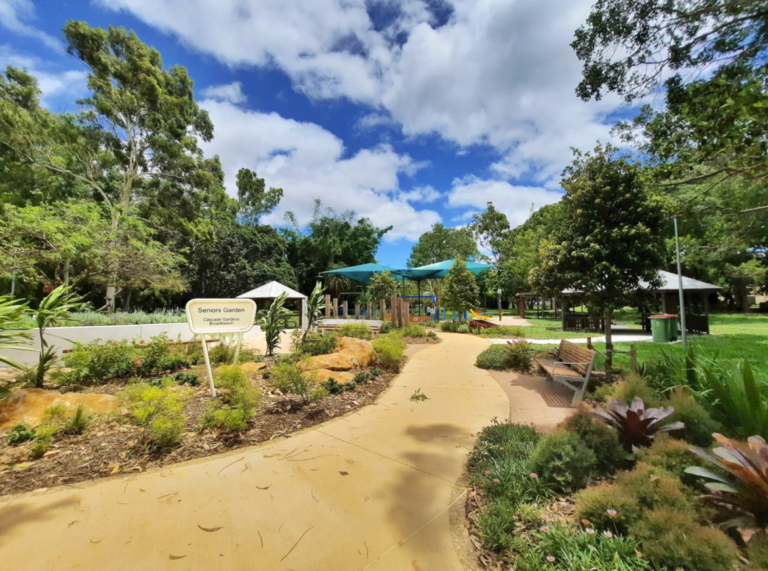
The Cascade Gardens at Broadbeach has a special addition of a sensory garden designed for seniors, but it also makes for great fun for little ones! In the sensory garden you’ll find elements including a musical gong, wayfinding design and productive gardens that encourage you to interact with the gardens through sight, touch and smell. It’s a beautiful addition to the Gardens and makes this spot perfect for multi-generational get togethers! The playground is older in style, but the children don’t seem to mind. You’ll find a flying fox, rope bridge, rock climbing wall and a carousel.
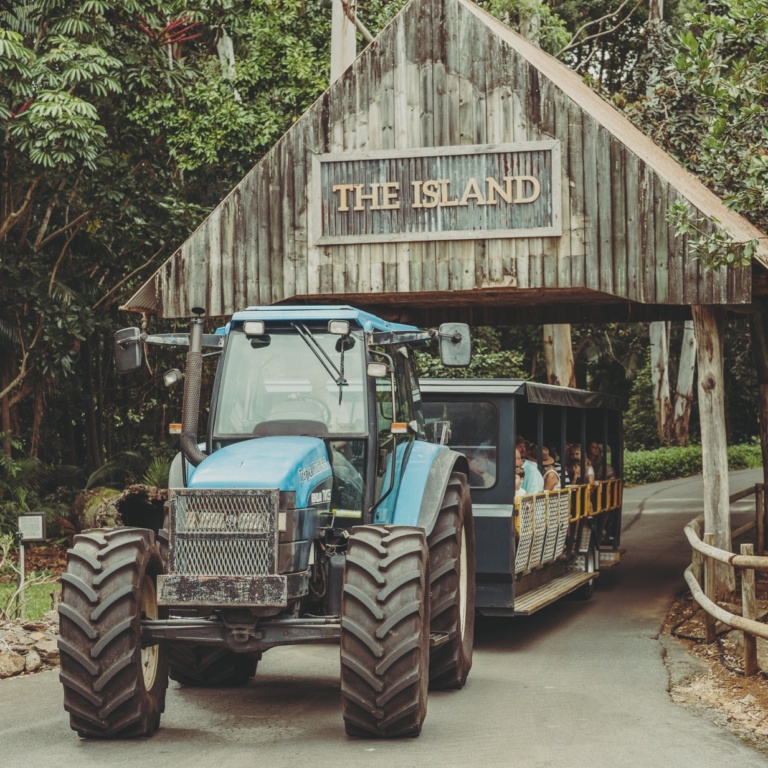
For the more active grandparents, a visit to Tropical Fruit World just over the NSW border in Duranbah is a fabulous day out for the family! Book a Farm Tour and experience a fruit tasting and a tractor-driven guided park tour. On the tour you can pick and eat bananas straight from the tree, crack macadamia nuts, feed and pat kangaroos, sheep, alpacas and miniature horses, and enjoy a short wildlife boat cruise too! At the end of the tour visit Wildlife Island and burn some energy on the flying fox, mini golf course and volleyball court. Then, check out the fruit market, café, and the huge sandpit by the grassed lawn to relax. If you live in the Tweed, Gold Coast, Byron, Lismore and Ballina, you can purchase tours at a discounted rate.
(Image with thanks to Tropical Fruit World)
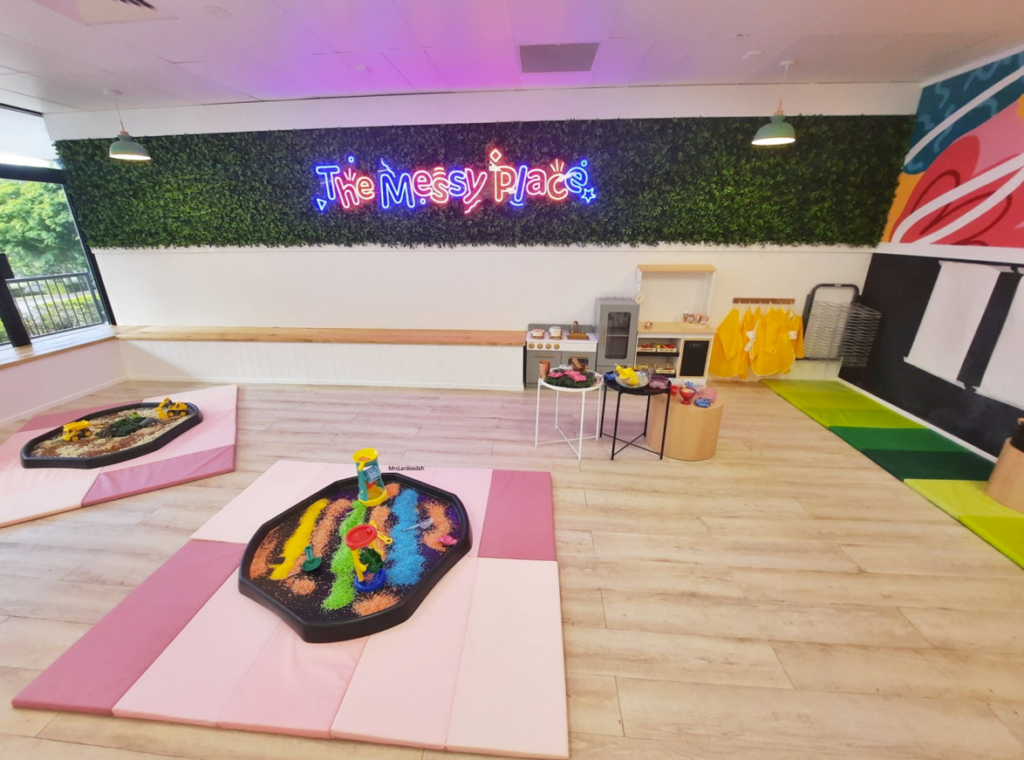
The generational gap can sometimes be hardest when the grandparents are tasked with spending time with energetic little toddlers. Keeping up with their ever-changing attention span, endless energy and natural curiosity is challenging for everyone! The Messy Place at Ashmore is the ultimate creative sensory play centre on the Gold Coast, designed exclusively for children under six years of age. They offer creative and messy play sessions in a safe and enjoyable environment, where they can unleash their imagination and make a mess. Exploration is encouraged, and grandparents can feel reassured being indoors in a secure, enclosed space. Sessions are booked on a casual basis and run five days per week.
National Grandparents’ Day is celebrated in Australia on the last Sunday of October. But as we all know, Grandparents Day is any day that the grandchildren can spend precious time with their grandparents. Whether you are a parent looking for how your child can have fun with grandma and grandpa or a grandparent seeking things to do with your grandchildren, we hope these ideas will inspire your time together.
We wholeheartedly believe in the proverb ‘it takes a village to raise a child.’ Little Scholars is proud to be a part of communities across South East Queensland, and we’re happy to play a small role in childhoods across the Gold Coast, Redlands and Brisbane.
We offer you and your child the very best facilities, resources and early educational, play-based programs available, which are underpinned by the early years learning framework. Our belief is that through quality education and care for children we can also encourage, assist and support the entire family.
Our dedicated team of educators are committed to the individual needs and interests of children and their families, and thus we encourage and welcome family input and involvement.
We aim to be like an extension of your family and are very relationship-driven. We support nurturing relationships between our educators and your child, the relationships your child has with the other children who attend, and we value our relationship with you as the parent and other family members. So book a tour today to get started!
Find Lara’s recommendations at her website Mrs. Lardeedah.com, and follow her socials Facebook and Instagram

While many Gold Coasters head to the southern suburbs on the weekend, the northern suburbs should not be overlooked for family-friendly weekend adventures! Starting in Stapylton and reaching to Pimpama, the most northerly suburbs of the Gold Coast also include Yatala, Alberton, Steiglitz, Gilberton, Norwell, Ormeau and Jacobs Well. Here you will find unique family activities, a range of family-friendly dining options, and some of the Gold Coast’s most unique play spaces. Here is your guide to getting the most out of a day in the Northern most parts of the Gold Coast.
South-east Queensland’s last original open-air Drive-In Cinema is located in Yatala, and boasts three massive screens accommodating up to 700 cars each night. Bring your camp chairs and sit out the back of your car to watch a movie, or bundle up the blankets, pillows and sleeping bags to make yourself comfortable in the back of your van, ute or car. Perfect for wriggly children, the privacy of sitting in your own vehicle means there is no need to worry if their bouncing around is bothering other cinema patrons. Movies screen every night of the week and they often host special event screenings too.
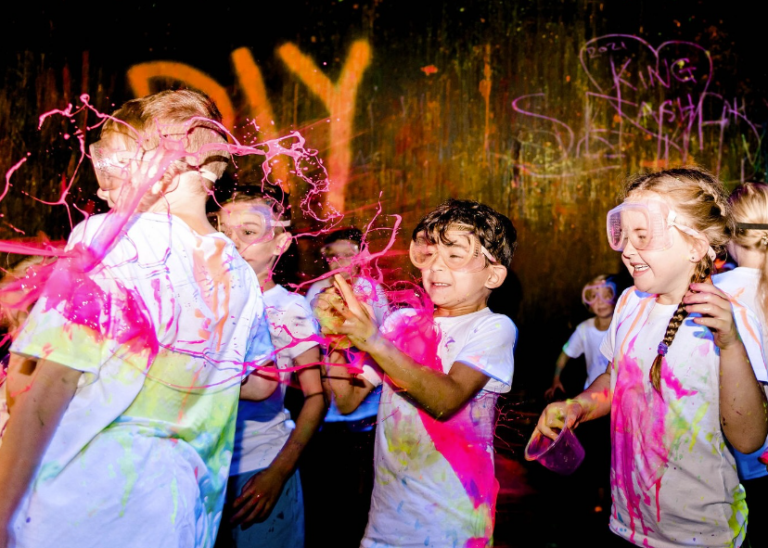
If your family is feeling creative, or looking to get messy, a workshop at DIY Invasion is sure to tick the box. Located at Staplyton, DIY Invasion run craft workshops ranging from resin art to painting, macrame and slime making – with their School Holiday Workshops always extremely popular for children. Another unique feature is their Splatter and Splash Room, which families can book for a private experience! Choose your own dance music, while letting your creativity run wild as you fling, flick, and splash paint around the room and over your fellow participants! This is a great space to unwind and tap into creativity.
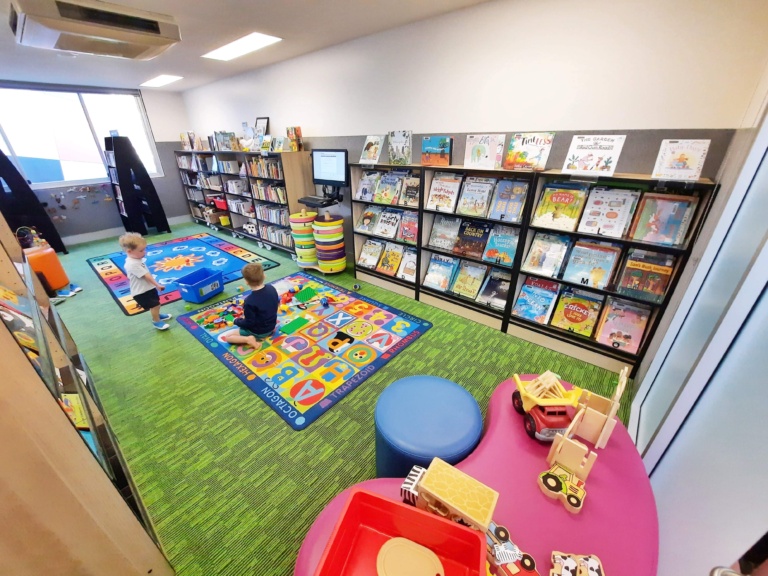
The only library located in the far northern suburbs, the Ormeau Community Lounge & Library is a hidden gem. Here you can visit the Gold Coast’s only Book Box corner, an early year’s library and play-based learning space delivered in partnership with Queensland State Library’s First 5 Forever program. Here children do not have to worry about being quiet, and they are actively encouraged to play with the many games and play resources available. Open six days a week, families can join in Story Time on Friday and Saturday mornings, or participate in Baby Rhyme Time and Toddler Time sessions during the week.
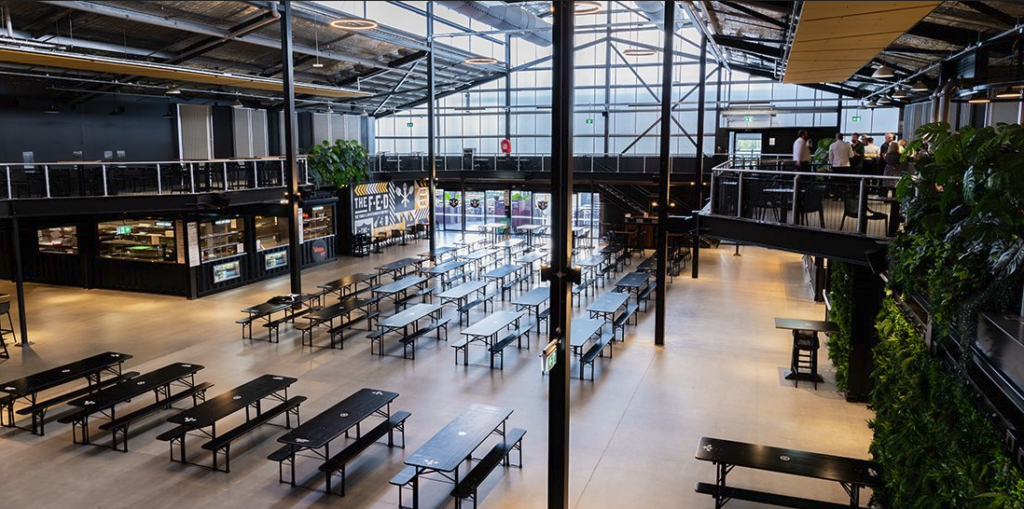
Distillery Road Market is a fresh and exciting new venue located in Eagleby, home to The F.E.D, a 2000-person food and entertainment space. Here you’ll find an expansive indoor/outdoor dining area, with a range of on-site eateries to choose from. Open Thursday – Sunday, the venue is family friendly with live music each evening and long beerhall-style tables to choose from. The best part is that diners can choose meals from six different food outlets, meaning that all tastes and dietary requirements can be catered for! The casual vibe of this venue is perfect for an early dinner with the family, where children and parents can relax, move around, dance and enjoy a great meal together.
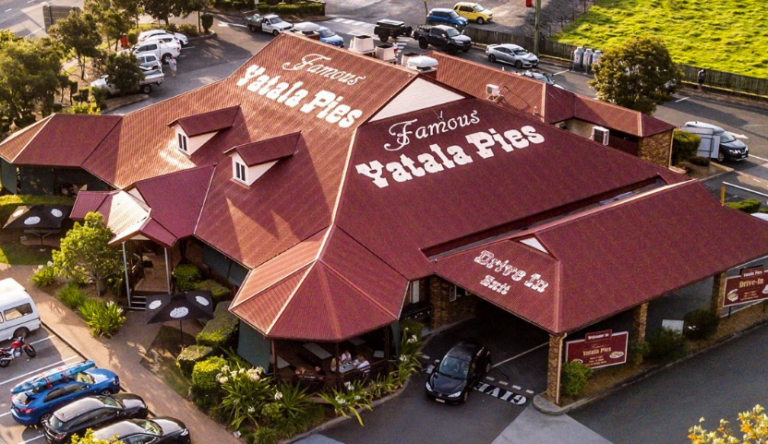
Yatala Pies has been a landmark in the Yatala area for more than 130 years, these days selling around 3,500 pies daily! Well known as a halfway stop on the journey between Brisbane and the Gold Coast, northern Gold Coast locals are lucky to have this icon right here in their backyard. Selling some of the best pies on the Gold Coast, the quality is exceptional and the range delicious. Choose from dine in or takeaway, you can grab a hot, ready-to-eat snack pie, or take-home, oven-ready family pies and snack pie packs. With something for everyone, the family will love a stop in at Yatala Pies any time of the day.
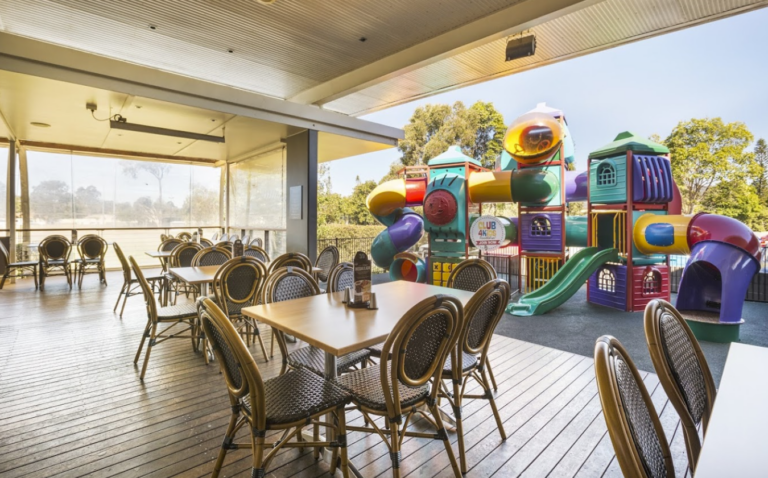
The Norfolk Tavern has got to be the most family-friendly dining option in the northern Gold Coast. Indoors you will find a bright and spacious dining room, while outside there is a wraparound veranda with ample space for dining, opening on to a huge children’s playground. The award-winning Bistro has menu options to suit every taste, from fresh seafood to steaks, pastas, salads and all the traditional pub fare. Extremely popular on weekends, be sure to book a spot on the deck if you are dining with children for easy line of sight from your table to the playground.
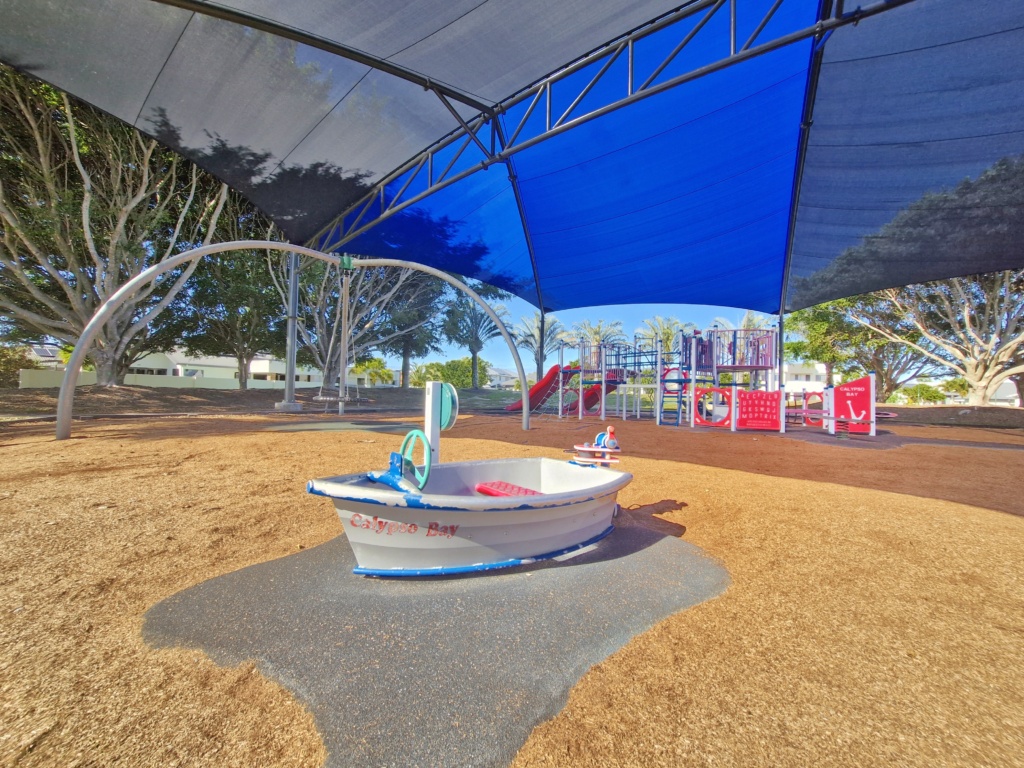
A nautical themed playground appropriate for its position by the water and close by the Calypso Bay Marina, here you’ll find a pirate ship brimming with bridges, wheels, slides and nets – be careful, you might even be asked to walk the plank! Underneath the pirate ship the imaginative play space is further extended, with a small shop counter set up, tunnel frames and other interactive game panels. The swing set with all abilities swing is always popular, as is the spinners and hammock swing. There’s also a little boat for children to pretend to fish or start the engine!
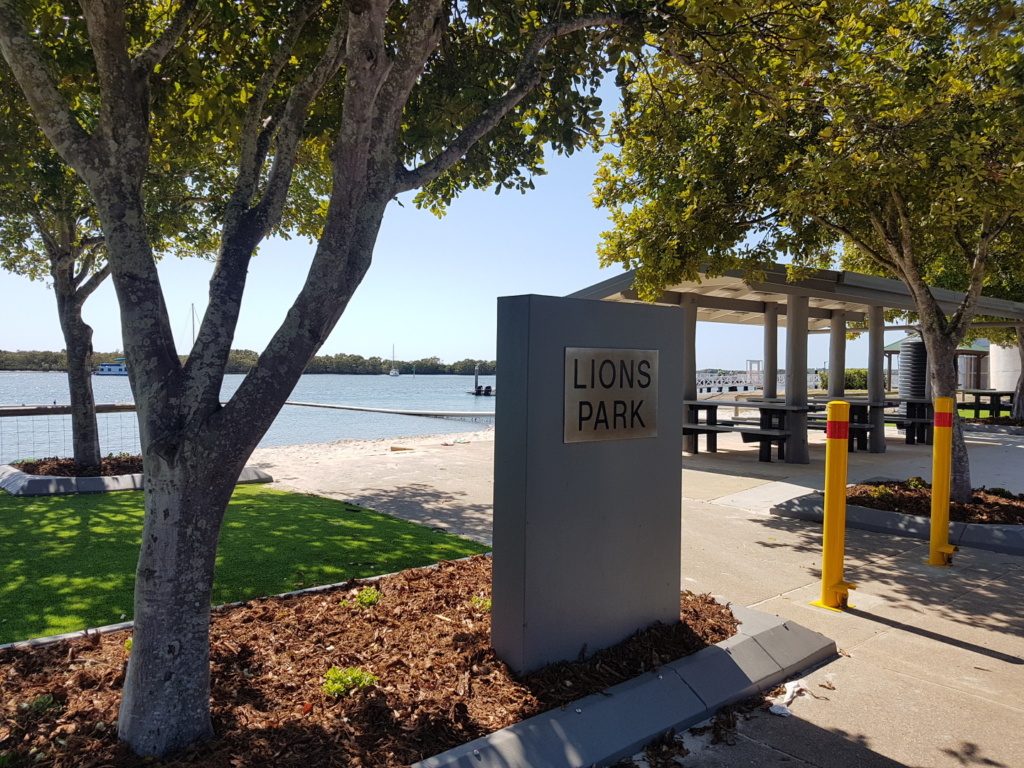
While many think the most northern beach area for children to swim is at Paradise Point, there is a lesser-known spot at the very northern edge of the Gold Coast – Lions Park at Jacobs Well. With easy access from the carpark, you are at a small, shaded beach in just a few steps. The swimming enclosure here has a small sandy beach, a large shade sail over the sand, and few waves, making it ideal for toddlers and younger children gaining confidence in the ocean. Parents will love the ability to sit on a blanket under the shade and still be close enough to their children in the water.
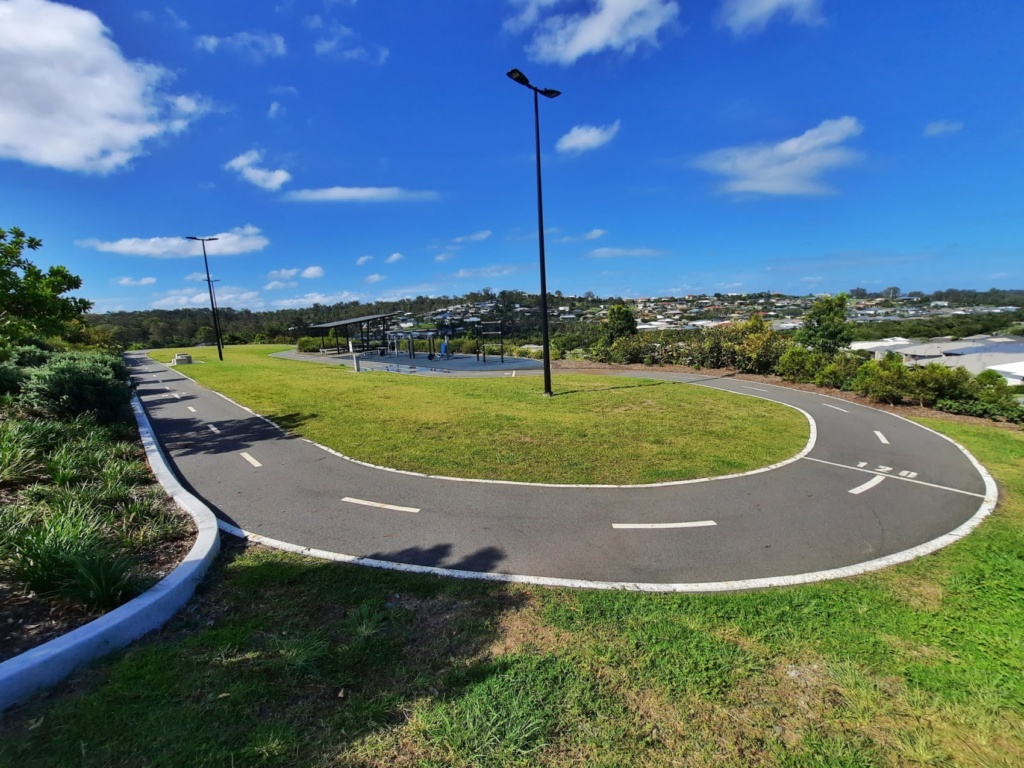
While the playground at Outlook Park, Ormeau may be tiny, pack the bicycles and prepare yourselves for the surprise bike tracks that make this a fabulous spot to visit! Set on a steep slope, Outlook Park is laid out over three levels. At the top you’ll find a small playground best suited for toddlers, and then on the middle and lower level there are two bike tracks, perfect for racing on. While the playground is very small, the bike tracks are great for bicycles, skateboards or scooters, and children will love lining up at the start line and racing the loops to the finish. Celebrate with some pretend play medal ceremonies on the dais at the track!
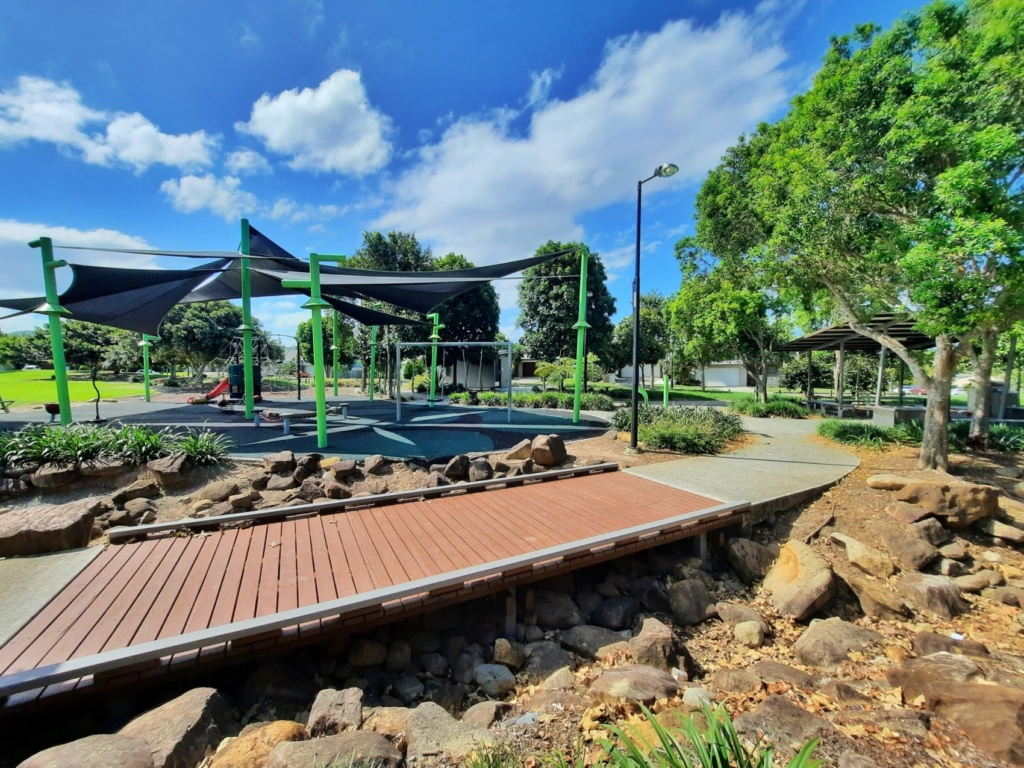
Hilltop Park in Ormeau is an older park, but still delivers a great time. Split into two sections, toddlers will love the smaller, shady play area with a car, climbing frame and mini playground with slide and swing. The main playground space is better suited for children over five, with a larger playground and slide, large climbing net, balance beams, spinners and swings. Children can also climb the ramp up to the old water tower, which has been converted into a play structure.
The northern Gold Coast offers a variety of unique and exciting activities for the whole family. From classic drive-in movies to hands-on creative workshops, scenic playgrounds, and delicious dining options, these suburbs have something for everyone. Whether you’re looking for a relaxing day by the water or a more adventurous outing, there’s no shortage of fun to be had. Next time you’re planning a family day out, consider exploring the hidden gems of Stapylton, Ormeau, Yatala, and beyond—you might just discover your new favourite weekend spot!
Little Scholars provides quality early education and care for children across South East Queensland, including five early learning campuses in Stapylton, Yatala and Ormeau.
We offer your child the very best facilities, resources and early educational, play-based programs available, which are underpinned by the early years learning framework. We believe that through quality education and care for children, we can also encourage, assist, and support the entire family.
Our dedicated team of educators are committed to the individual needs and interests of children and their families, and thus we encourage and welcome family input and involvement.
Find Lara’s recommendations at her website Mrs. Lardeedah.com, and follow her socials Facebook and Instagram

The Gold Coast is known for its abundance of good food and stunning dining options, but when you have young children in tow – often the thought of dining out can be daunting. Thankfully, many local restauranteurs have heard the call of parents seeking family-friendly dining options. We’re now seeing dining venues with amazing menus, family-friendly fit outs and features to help keep the children occupied while you enjoy a hot meal. Whether it be a playground, a simple children’s corner, or open spaces to move around safely, there are plenty of choices for you to enjoy your next meal out. Here are my top six family-friendly dining venues on the Gold Coast that you should be sure to visit!
This shopping centre café is a hidden gem, saving the sanity of parents for many years now. With opening hours stretching from 5.30am – 9pm, you can often find those parents with early-risers enjoying a hot coffee at Café 63 in the early hours. Located in the incredible “Backyard” precinct at Westfield Coomera, the outdoor dining area overlooks a fun-filled obstacle course with adventure play suited to four-eight year olds. For the youngest children, a nearby splash pad and toddler sensory zone also serve as great spaces to stretch the legs while waiting for your meals to be served. The menu here is extensive and well-priced, including a fabulous children’s menu that will please everyone.
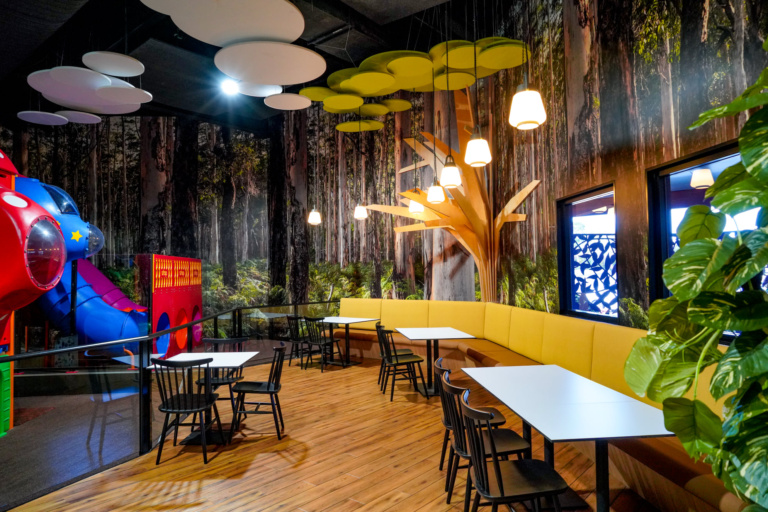
Here you will find a huge indoor children’s playground for four-12 year olds, with a family specific dining space attached. Separate from the rest of The Wattle Hotel’s restaurant, this glassed-off dining room overlooks the playground and contains about 15 tables. Here children can easily move back and forth between the playground and the table while their parents can see them at all times. There is a great children’s menu and delicious daily specials to enjoy, this is modern bistro dining that can be enjoyed by all the family.
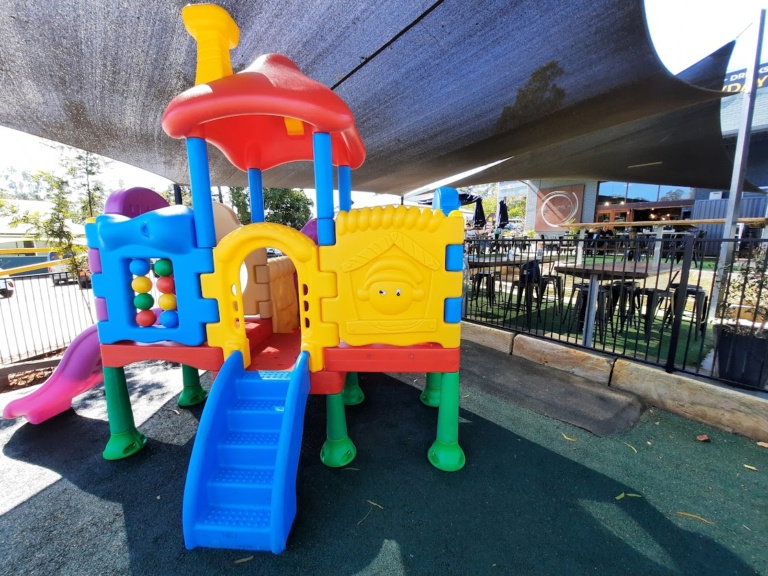
A café best known amongst the Coast’s cyclists thanks to its location near the Velodrome and bike shops, Cadence Café also caters beautifully to families seeking great food. Set across three terraced levels, the venue is connected by a central path and steps – at the top is the café, the middle level has plenty of dining tables and chairs, and the lower level is home to high bar tables overlooking a fenced children’s play space. All levels are shaded by a beautiful fig tree, have ramp access, and dogs are also welcome in the outdoor areas. Serving breakfast and lunch, the menu caters well to families, and you are sure to enjoy a delicious meal.
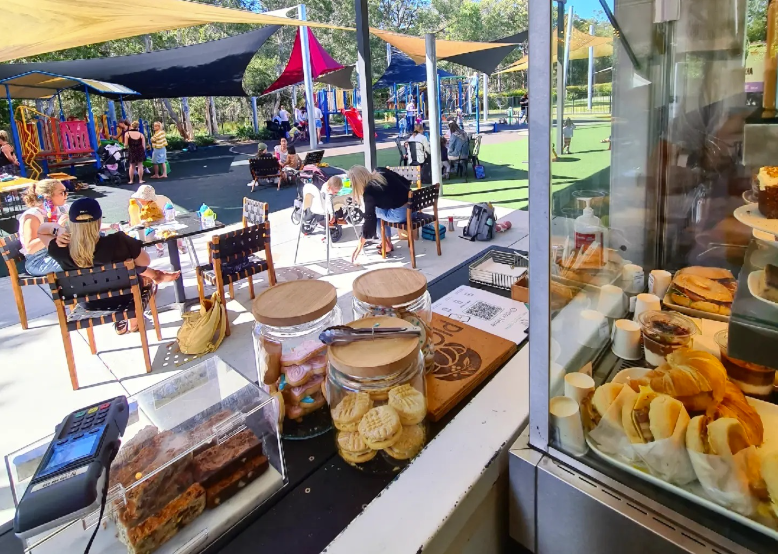
Just off the hustle and bustle of Olsen Avenue sits the Latte Lounge, a family-friendly oasis amongst the gum trees. Here you will find house-roasted specialty coffee and a delectable brunch menu, plus one of the best children’s menus you will find at a café. The open-air café is almost the second-best attraction, when you see the large, easily accessible playground right in the middle of the café. Designed for all ages, this fenced café and playground is covered by large shade sails and offers plenty of shady spots to enjoy your meal. With its central Gold Coast location, this is also an extremely popular spot for birthday parties and play dates. Thankfully, due to the size of the café and playground it never feels overly busy or crowded and is always a delightful outing.
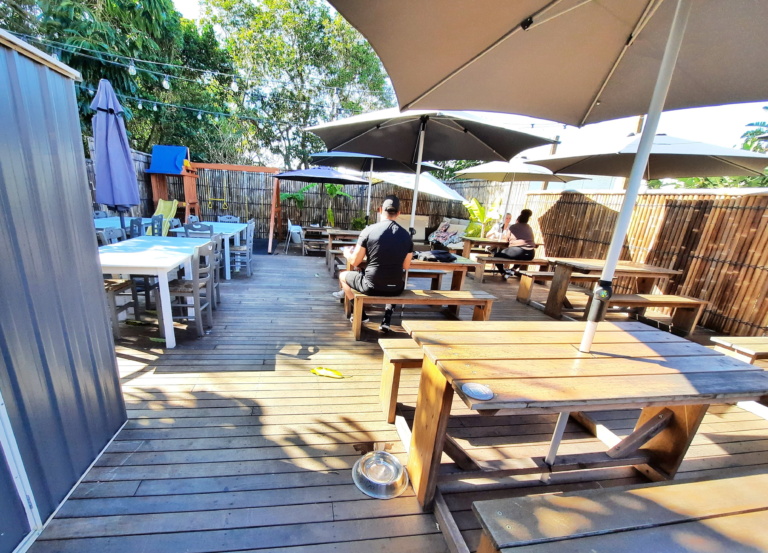
This hidden gem on the southern end at first appears to be a juice bar, but venture inside and you will find a breezy indoor/outdoor café with children’s playground! Popular with the locals, this unassuming little spot is filled with sunshine, great food and service with a smile. This is a family-run café with its roots in healthy superfoods that taste phenomenal. Dog friendly, the outdoor deck is the place to be, with easy line of site to the children’s playground. The café kitchen is only open Thursday – Monday, but the juice and smoothie bar is open 7 days.
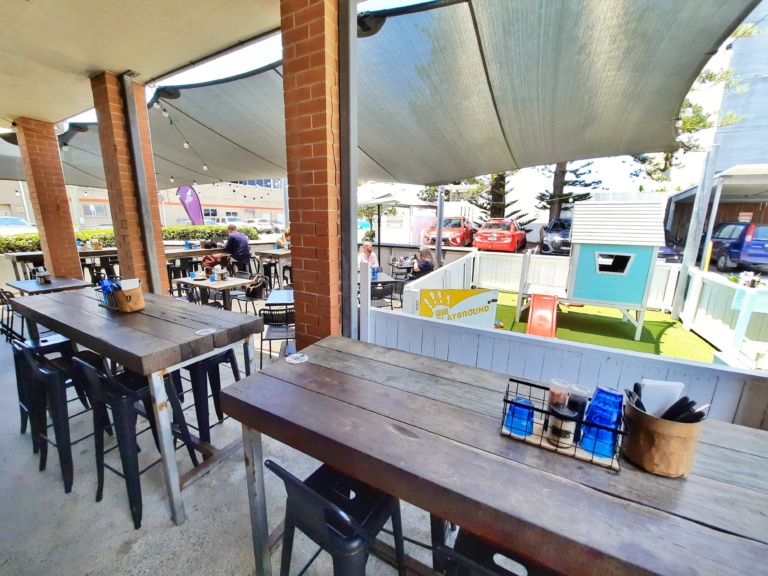
With beautiful coastal vibes, indoor/outdoor dining is essential on the Gold Coast, and BSKT serves it up perfectly. Located just steps away from the beach, BSKT has delicious food, ample seating and a fenced children’s play area. Pronounced biscuit, this menu is packed with vibrant colours and bold flavours, but also caters well to children. BSKT doesn’t take books and this spot is extremely popular on the weekend, but wait times are usually short. Be sure to grab a spot outside under the patio to have easy access to the play area! Why not pack the swimwear and walk over to the beach afterwards!
Find Lara’s recommendations at her website Mrs. Lardeedah.com, and follow her socials Facebook and Instagram
Children’s positive views of themselves as learners are more important than being told they are clever.
This insight from Nathan Wallis’s talk at the Australian Childcare Alliance (ACA) conference resonated with us, and we believe it’s valuable for parents to hear. Our intention isn’t to make parents feel guilty for praising their children’s intelligence. We understand that parents aim to foster a strong sense of self and ability in their children, and we fully support this. However, Wallis emphasises that before the age of seven, children don’t need to prove their intelligence. Instead, they need to develop learning skills through play and believe in their ability to learn. According to Wallis, more play and less structured learning before age seven leads to better outcomes in adulthood.
“To put it simply, before seven, it doesn’t matter how clever your child is. What matters is how clever your child feels and their disposition towards themselves as learners,” Wallis, an educator who focuses on neuroscience, explained on the Future Focus podcast.
“You’re better off having a six-year-old who can only count to 20 but thinks they’re a good learner than a six-year-old who can count to 100 but doubts their cleverness.”
Wallis highlights that free play boosts creativity and problem-solving, which are essential for intelligence. Letting children freely build, create, and explore supports flexible thinking and a positive learning mindset.
At the conference, which attracted hundreds of early childhood educators, Wallis offered advice on how to support children in their confidence and ability to learn:
Experts at Early Childhood Australia agree that children learn about themselves, others, and the world around them through play.
“If you provide your child with plenty of opportunities for playing, exploring, discovering their interests, solving problems, and tackling challenges, then you’ll be laying a strong foundation for building self-confidence,” says David Lyons, CEO of Nido Early School, in a post on ECA’s The Spoke blog.
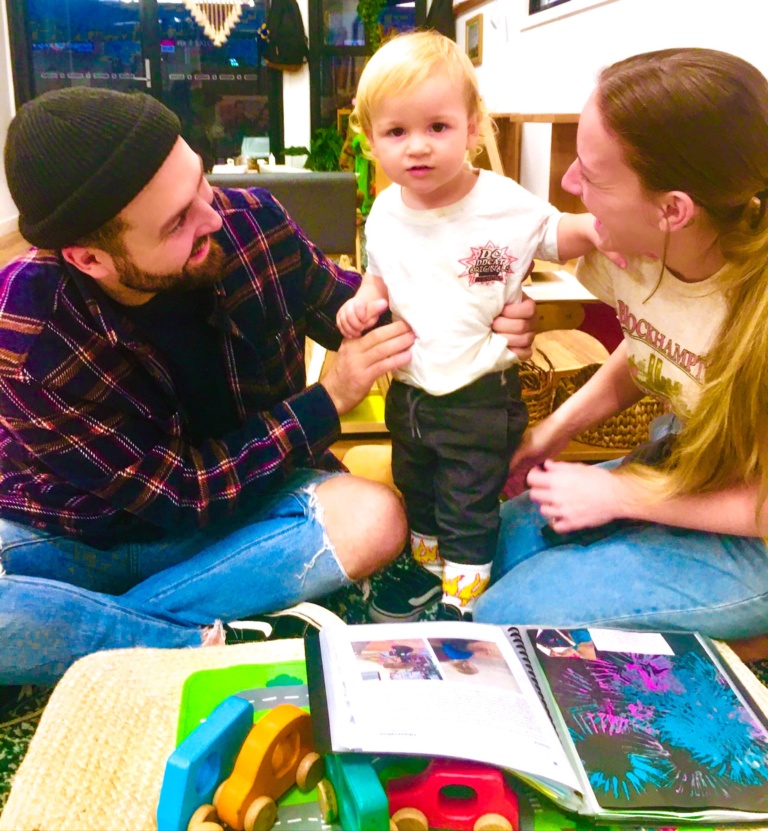
According to Be You, the national mental health and wellbeing initiative for learning communities in Australia, praise is most effective when adults are mindful of how and when they use it.
When praising children, Be You suggests focusing on their efforts and achievements.
“Praise that’s specific and acknowledges the process of completing an activity or solving a problem helps develop children’s learning and motivation. For example, you might say, ‘You put away your toys so nicely,’ ‘I noticed you were really trying hard at building that block tower,’ or ‘You’ve used so many bright colours in your painting.’ Children can then use this learning when they have similar experiences in the future.”
Lyons agrees and cautions against overpraising.
“Children need to discover and learn those things that give them personal enjoyment and fulfilment, not just do things to please their parents. Similarly, comparing a child to others can be detrimental to their confidence and self-esteem.”
Dealing with disappointment is also crucial for developing confidence.
“Everyone fails to achieve their goals sometimes – and this isn’t a bad thing. You can build children’s ability to deal with challenges by responding sympathetically and with encouragement, helping children focus on what they can change, and challenging ‘I can’t’ thinking by showing and saying you believe in them and reminding them of their achievements,” says Be You.
Wallis reinforces that play enables children to develop social, cognitive, and emotional skills through their own interests and in creative and innovative ways.
“Play-based learning teaches creativity, which is fundamental to growing intelligence and the ability to problem-solve. When children can take their time and make multiple attempts before achieving success, they build resilience and other important skills needed later in life,” says Wallis.
Supporting children in developing a positive self-view as learners is crucial, especially in their early years. Emphasising the importance of play over structured learning fosters creativity, problem-solving, and resilience. By providing nurturing relationships, paying attention to their efforts, and creating flexible learning environments, we can help children build the confidence they need to thrive.
As Nathan Wallis and other experts highlight, the goal is to make children feel capable and enthusiastic about learning. This foundation will benefit them not only in school but throughout their lives. At Little Scholars, we encourage our little ones to play, explore, and believe in themselves – because how they see themselves as learners today will shape their success tomorrow.
At Little Scholars School of Early Learning, we’re dedicated to shaping bright futures and instilling a lifelong passion for learning. With our strategically located childcare centres in Brisbane and the Gold Coast, we provide tailored educational experiences designed to foster your child’s holistic development.
Let us hold your hand and help looking for a child care centre. Leave your details with us and we’ll be in contact to arrange a time for a ‘Campus Tour’ and we will answer any questions you might have!
"*" indicates required fields
Let us hold your hand and help looking for a child care centre. Leave your details with us and we’ll be in contact to arrange a time for a ‘Campus Tour’ and we will answer any questions you might have!
"*" indicates required fields